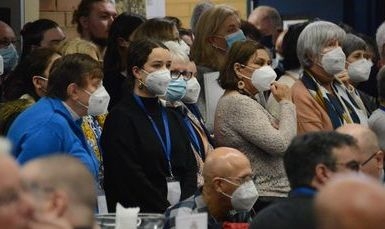

Catholics for Renewal
Subtitle
News 2022
Views expressed are those of the Authors and may or may not always represent those of Catholics For Renewal.
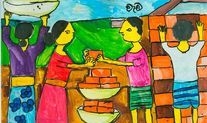
Editorial (6 December): Witnessing Gender Equality in the Church: When?
Limited Extract:
.....In their 17,500 submissions to the Plenary Council Australian
Catholics insisted that the equal dignity of women and men had to be
addressed as a priority. The Motions and Amendments document, published
on 29 June 2022, addressed it with an Introductory Statement and 6
Motions, and prior to publication all Members, including bishops, were
invited to submit their concerns as amendments to the Motions and speak
to those concerns..........
Read full Editorial HERE Image: Gender Equality drawing for the EC by 8yo girl from Sri Lanka Previous Editorials: HERE
2022 Survey invitation by Professor Stephen Bullivant and Dr Philippa Martyr, 24 September
As previously detailed here, this survey asks anyone who identifies as Catholic about their beliefs, practices, and opinions. It's being run from the University of Notre Dame Australia (Ethics ID 2022-119S) by Professor Stephen Bullivant and Dr Philippa Martyr. They are collecting data from late September to December 2022. Please use this link for further details and to complete the survey, which will take around 10-15 minutes to complete. Feel free to share the link with anyone you think might be interested.

Some Australian Catholics fear that the momentum from their unique synodal experiment could be lost… unless the international Synod comes to the rescue
Extract from John Warhurst, Pearls & Irritations, Jihn Mendaye website, 10 December 2022
The Catholic Church in Australia is living in an age of transition, but also of continuity. This notion is summed up in the saying, "The king is dead, long live the king", meaning that the transition from an old to a new monarch is one of continuity as well as change. For years the Australian Church has devoted itself to the whole-of-church consultation known as the Plenary Council. That council concluded its work at the end of its Second Assembly in the second week of July. Its members were thanked and departed never again to come together in the same form. In this sense, reinforced in recent official correspondence, the Plenary Council is dead. In another sense, of course, it remains alive. The Plenary Council decrees were considered and approved by Australia's bishops at their Australian Catholic Bishops Conference (ACBC) November meeting, then sent off to Rome for review. In six months' time they will be officially promulgated. Each of the decrees has been assigned to one of the official bishops' commissions for monitoring and coordination. Progress in implementation of the decrees is to be reported back to the ACBC in May 2023, then 2025 and finally 2027. Back in July at the Second Assembly it was agreed that a new national synodal roundtable, representing the wider Church, would be set up to coordinate the review, but no announcement about any progress with that has yet been made. It appears that it will be created late in 2023 after the First Assembly of the Synod of Bishops. "Enlarge the Space of your Tent" At this national level lay Catholics in Australia risk being disenfranchised at a critical moment. There is a real danger that the momentum generated by the Plenary Council will be lost. Effectively implementation is now in the hands of each diocesan bishop. That has unpredictable consequences. In the recently published ACBC Annual Report for 2021, the retiring president Archbishop Mark Coleridge plainly lays out this state of affairs that "the real powers in the Church rest with the dioceses"; while he also predicts optimistically that "the days of dioceses as independent fiefdoms and the bishops as a law unto themselves are gone". Tell that to lay Catholics in many dioceses where business as usual prevails and little is being done about the reforms agreed at the Plenary Council. That is what many former Plenary Council members report from the ground.....(More) Photo: plenary council dead-long live synod of bishops, Fiona Basile, John Menadue website 20221210
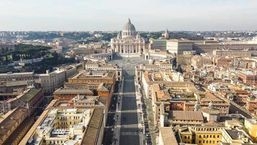
For those still interested, the erosion of episcopal authority from the clerical sex abuse scandal continues at pace.
Extract from Francis Sullivan, Pearls & Irritations, John Menadue website. 10 December 2022
Despite the findings from any number of independent inquiries and investigations of the closed and self- referential culture of the institution, the official Catholic Church stance remains defensive and controlling. The Vatican’s history of handling abuse cases has been riddled with a misguided clericalist attitude that accommodated and protected their own. Priest abusers were seldom defrocked, offending bishops were often conveniently furloughed and the curial instinct to resist submission to civil authorities perpetuated. The Church’s canon law imposes mind numbing time delays and the verdicts of canonical trials seem devoid of any consistent jurisprudence leaving local bishops the unenviable tasks of defending the indefensible. This week the French bishops announced the establishment of an inter-diocesan criminal canonical court to hear, amongst other things, allegations against priests who sexually abused adults, not children. To outsiders this distinction seems odd. Surely a properly constituted tribunal should be able to handle clerical sex abuse cases involving both adults and children. Supposedly, the Vatican considers the abuse of children a more extreme crime and therefore it should remain their exclusive purview. Maybe, the Vatican wants child abuse cases dealt with ‘out of country’ to limit any potential ‘local leniency’ afforded to offenders. Or, just maybe, the Vatican’s hyper sensitivity to the fate of some priests and bishops in matters pertaining to the clerical sex abuse of children warrants their particular scrutiny. In any case, what this demonstrates is the degree to which the Roman curia will cling to its ultimate control over how priests and bishops will be dealt with once found guilty of child sexual abuse crimes. And that does not bode well for transparency and accountability. So far the Vatican tribunals do not publish reasons for their findings........(More) Photo: St-Peters-Square, iStock, John Menadue website 10 December 2022

Extract from CathNews, CNS, 5 December 2022
Making churches accessible and services understandable is important but having wheelchair ramps and sign-language interpreters is not enough for a parish to call itself “inclusive”, Pope Francis said at the weekend. The Church also must meet people’s needs for “belonging, relating to others and cultivating their spiritual lives so they experience the fullness and blessing of the Lord” for the “unique and marvellous gift” that they are, the Pope told a group of people with disabilities and those who minister with them. The Pope’s meeting with the group on Saturday marked the International Day for Persons with Disabilities; the Pope also issued a written message for the occasion. In the meeting, Pope Francis called for the “conversion” of the Catholic community to move from using inclusion as a “slogan” to ensuring people with disabilities are welcomed, integrated, recognised and supported as full members of the community. “There is no inclusion if the experience of fraternity and mutual communion is missing,” the Pope said. “There is no inclusion if there is no conversion in the practices of coexistence and relationships.” Inclusion, he said, means “each person, with his or her limitations and gifts, feels encouraged to do his or her part for the good of the entire ecclesial body and for the good of society as a whole.” In his written message for the international day, Pope Francis focused on how Catholics with disabilities can teach others one of the central messages of the Gospel: human beings need God’s love, mercy and strength.....(More)
Extract from CathNews, Sydney Morning Herald, 5 December 20222
Further details about what an Indigenous Voice to Parliament would look like and how it would affect communities will be released before the referendum. Indigenous Australians Minister Linda Burney said Australians would be “well informed” about what they were voting for when they go to the ballot box. “They will well understand the reason for the Voice to improve the life outcomes for First Nations people, but also issues around how it will work,” she told the ABC’s Insiders program. “And, importantly, what it will mean in uniting this country.” Burney said she wouldn’t get ahead of the working groups tasked with refining the detail, but it was clear what the Voice will be and will not be. “It will not have a veto right of the parliament,” she said. “It’s advisory and it will also not have a program delivery function.” The federal National Party has already come out against the establishment of the Voice to Parliament. Indigenous Coalition Senator Jacinta Price said a Voice to Parliament would create more division and called for more practical measures to address disadvantage. But the Nationals aren’t unified in their opposition. Federal MP Andrew Gee said he would support the Voice, as would the West Australian branch of the party. The Liberals maintain they want to see more detail about the proposal before coming to a definitive position....(more)
Extract from John Lavenburg, Crux, 3 December 2022
NEW YORK – Soon into the new year, the Diocese of Santa Rosa, California, will join a growing list of U.S. Catholic dioceses to file for Chapter 11 bankruptcy as it faces a wave of sexual abuse lawsuits. Bishop Robert Vasa of Santa Rosa announced in a Dec. 2 statement that the diocese’s attorneys will file for Chapter 11 bankruptcy sometime between Dec. 31 and March 1, 2023, saying the decision was “the inevitable result of an insurmountable number of claims.” The diocese is facing more than 130 claims dating from 1962, when the diocese was established, through the present day, with the majority of the cases being from the 1970’s and 1980’s, Vasa said. The claims were filed under the 2019 California Child Victims Act, which allowed for a three-year period where victims of child sex abuse could come forward with claims that would have expired under the previous statute of limitations. The three year window created by the bill began Jan. 1, 2020, and expires in less than a month after the start of the new year.....(More)
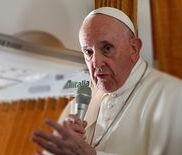
Russia's foreign minister has accused Francis of making "un-Christian" remarks and one of Ireland's former women presidents says he's speaking "misogynistic drivel". So what gives?
Limited extract from Robert Mickens, Letter from Rome, Subscription Journal La Croix International, 3 December 2022
At the very start of his pontificate nearly ten years ago, Pope Francis distinguished himself from his most recent predecessors by adopting an informal and colloquial way of communicating. He showed early on that he had no intention of merely reciting prepared speeches or sticking to the stodgy old Vatican script pertaining to protocols and ceremonies. In fact, over this past decade we've all gotten used to a chatty pope who seasons almost every address he delivers (that is, when he actually reads them) with some aside or impromptu remark, often using the salty language of the working class. At times he also throws out a word or phrase of his own invention, something the pundits call (after the Jesuit pope's family name) "Bergoglisms". This often drives officials in the Roman Curia absolutely crazy, while it greatly delights almost everyone else. Well, not everyone. And not all the time. Francis pokes the bear Several days ago Francis raised the ire of officials in Russia by a comment he made about the Ukrainian war in one of his latest interviews. (Yes, this is also the pope who does interviews -- lots of interviews.) This time it was with America, the US Jesuit-run magazine based in Midtown Manhattan. "How would you explain your position on this war to Ukrainians, or Americans and others who support Ukraine?" the pope was asked. "When I speak about Ukraine, I speak about the cruelty because I have much information about the cruelty of the troops that come in," he said. In hindsight, it's clear that he should have stopped there. But he did not. "Generally, the cruelest are perhaps those who are of Russia but are not of the Russian tradition, such as the Chechens, the Buryats and so on," said the 85-year-old pope. Sergei Lavrov, the Kremlin's foreign minister, wasted no time in voicing displeasure with the pope's remarks. "Pope Francis calls for talks but also recently made an incomprehensible statement, completely un-Christian, singling out two Russian nationalities into some category from which atrocities can be expected during hostilities," he said. "Of course this doesn't help the cause and the authority of the Holy See," he added. Whoa!.......(More) Photo:Pope Francis CNS Paul Haring
Extract from By Elise Ann Allen, Crux, 3 December 2022
ROME – Ukrainian authorities, after conducting raids on several parishes, announced Friday a ban on religious organizations “affiliated with centers of influence” in Russia, and said an examination would be made of potential ties between Ukrainian and Russian Orthodox churches. This decision was described by Ukrainian President Volodymyr Zelenskyy as necessary in order to prevent Moscow from being able to “weaken Ukraine from within.” Orthodox Christians make up the bulk of Ukraine’s population of 43 million, and for years were subject to the authority of the Russian Orthodox Patriarchate. However, in 2019 the spiritual leader of Orthodox Christians worldwide, Patriarch Bartholomew of Constantinople, gave permission to Ukraine to form a church independent of Moscow, leading to a split in Ukraine’s Orthodox community between those still loyal to Moscow and those who joined the newly independent Ukrainian Orthodox Church....(more) Photo: Religious icon shrapnel damaged Bohorodychne, eastern Ukraine, Leo Correa AP, Crux 20221203

Letter To The Editor 1. The articles I read on the U.S. bishops' conference set my hair on fire. I can't bear to see the U.S. Catholic leaders turning into the Pharisees and Sadducees that lived in Jesus' time. What would these bishops do if Jesus came back today as a fully human being? They'd probably do to him exactly what the Pharisees and Sadducees did to him when he came the first time..... I honestly do not know what I'm going to do if these hard right conservative bishops run rampant through what is good and wonderful and necessary in our church today...Mary Wudtke, Chicago, Illinois......(More)
Extract from CathNewsNZ, Catholic News Agency, 1 December 2022
Pope Francis has unequivocally stated that women cannot be ordained as priests; however, he emphasised the important role they have to play in the life of the Church. In an interview with America Magazine, Francis responded to a question posed by Kerry Webber, executive editor of the magazine published by the Jesuits of the United States: “Many women feel pain because they cannot be ordained priests. What would you say to a woman who is already serving in the life of the Church but who still feels called to be a priest?” The Holy Father was unequivocal in his response: “And why can a woman not enter ordained ministry? It is because the Petrine principle has no place for that,” the pope said. “The ministerial dimension, we can say, is that of the Petrine church. I am using a category of theologians. The Petrine principle is that of ministry,” the Holy Father said. A theology of the ‘Marian principle’ The pope explained that there is another “theological” way in which women play a vital role in Church life. The dignity of women, he said, reflected the spousal nature of the Church, which he called the “Marian principle”. “The way is not only [ordained] ministry. The Church is woman. The Church is a spouse. We have not developed a theology of women that reflects this,” Pope Francis said. “The Petrine principle is that of ministry “But there is another principle that is still more important, about which we do not speak, that is the Marian principle, which is the principle of femininity in the Church, of the woman in the Church, where the Church sees a mirror of herself because she is a woman and a spouse. “A church with only the Petrine principle would be a church that one would think is reduced to its ministerial dimension, nothing else. But the Church is more than a ministry. “It is the whole people of God. “The Church is woman. The Church is a spouse. Therefore, the dignity of women is mirrored in this way,” the pope said. “Therefore, that the woman does not enter into the ministerial life is not a deprivation. “No. Your place is that which is much more important and which we have yet to develop, the catechesis about women in the way of the Marian principle,” he said. “There is a third way: the administrative way. “The ministerial way, the ecclesial way, let us say, Marian, and the administrative way, which is not a theological thing, it is something of normal administration. And, in this aspect, I believe we have to give more space to women,” Pope Francis said. Theologians must explore and venture At a recent meeting with members of the International Theological Commission, Pope Francis told the Commission that it is the vocation of the theologian is always to risk going further because they are seeking and they are trying to make theology clearer. “The theologian dares to go further, and it will be the magisterium that will stop them,” the pope said........(MORE)

Vatican has been frequent target for denial-of-service attacks and hacks
Extract from Timothy H.J. Nerozzi, Fox News, Associated Press, 1 December 2022
The Vatican has been combating a stream of cyber attacks since Tuesday, a church official confirms. Beginning Tuesday morning, users have reported issues accessing the Vatican's official website. Attempts to access the site have frequently been met with 404 error responses. A series of attempts to compromise the Catholic Church's central website is what has forced the page to go down repeatedly this week, according to the Vatican. "Technical investigations are ongoing due to abnormal attempts to access the site," Vatican spokesman Matteo Bruni told Reuters on Wednesday. Bruni reportedly offered no further details. The Vatican website is a hub for users to read papal addresses, reference church calendars, as well as connect to Catholic charities and outreach programs. As of Thursday morning, Fox News Digital has been able to access the site, but has been given sporadic 404 errors when navigating it. The Vatican's website is a frequent target for cyber attacks. In 2018, the Vatican and the Catholic Diocese of Hong Kong were the targets of alleged Chinese state-backed hackers. It also offers its own internal news service and daily bulletins of Pope Francis and his engagements. In 2015, the personal data of journalists at Vatican radio was leaked online and the Vatican's website hacked twice in several days, with both attacks attributed to the amorphous Internet activist group Anonymous. The group claimed to have taken down the Vatican website to protest everything from Catholic doctrine to the sexual abuse of children....(Source). Image: Vatican Swiss Guards St Peter's AP Andrew Medichini, Fox News 20221201

Extract from CathNews NZ, 1 December 2022
China’s Foreign Ministry spokesperson said the country is willing to expand the “friendly consensus” achieved with the Vatican over bishops’ nominations. Zhao Lijian (pictured) was responding to complaints from the Vatican that Beijing was violating a 2018 interim accord over bishop appointments. The Vatican issued an unusually harsh statement on Saturday complaining that Beijing on 24 November had installed Bishop John Peng Weizhao as an auxiliary bishop in the province of Jiangxi, which the Vatican doesn’t recognise as a diocese. “The Holy See noted with surprise and regret the news of the ‘installation ceremony’” of Bishop John Peng Weizhao of Yujiang as auxiliary bishop of Jiangxi, “a diocese not recognised by the Holy See,” said the note released by the Vatican on 26 November, two days after the installation of the bishop. At a briefing on Monday, Zhao said he was unaware of the specific situation involving Peng. However, he said that relations between China and the Vatican had improved over recent years for the benefit and “harmonious development” of Chinese Catholicism. “China is willing to continuously expand the friendly consensus with the Vatican side and jointly maintain the spirit of our interim agreement,” he told reporters. In its statement, the Vatican said Peng’s installation ceremony took place after “long and heavy pressure from the local authorities. “In fact, this event did not take place in accordance with the spirit of dialogue,” or what is called for by the 2018 accord, the Vatican statement said. In the past four years, only six bishops have been named and installed under the terms of the agreement. China and the Vatican haven’t had diplomatic relations since 1951, following the Communists’ rise to power and the expulsion of foreign priests. The Vatican has sought in recent years to open contacts and reduce frictions, particularly over the appointment of bishops. Since the break in ties, Catholics in China have since been divided between those who belong to an official, state-sanctioned church and an underground church loyal to the pontiff. Estimates of the total number of Chinese Catholics run between 6 million and 12 million worshipping in both the recognised Patriotic Catholic Association and the underground church. The Vatican’s efforts toward reconciliation led to its willingness to sign what it admits is a far-from-ideal accord in 2018, which regularised the status of several bishops and paved the way for future nominations. Full details of the agreement have never been made public, but Pope Francis has claimed he has the final say in the process....(More). Photo: Zhao-Lijian-China CathNews NZ 20221201

Limited extract from Susan Bigelow Reynolds, US, La Croix, ex Commonweal, 30 Nov 2022
Whenever I read a Vatican statement on the role of women, I conduct a thought experiment. I imagine that I know nothing whatsoever about the Roman Catholic Church or its faithful. If this document were my only source of information, I ask from behind my ecclesial veil of ignorance, what basic conclusions might I draw about women in the Church? I've done this mental exercise with dozens of texts over the years, and one conclusion surfaces over and over: women are all exactly the same.It's a rather astounding conclusion to draw about a tradition populated all the way down by women who lived and died in wild and unique ways—shaving heads, chronicling visions, leading armies, renouncing fortunes, forswearing marriage, and birthing God, to name a few highlights. Yet there is little in Church teaching on women that does not appear to proceed from a fundamental illusion that women—the billions of us—constitute some sort of monolithic, quasi-theoretical body with an articulable essence, singular vocation, and narrow set of essentialized gifts.A sociologist attempting to devise a typology of women in the Church based on magisterial writing would, in the end, not find much to differentiate in the single category of "women." This is the governing imagination behind Pope John Paul II's notion of the "feminine genius." But it also shapes, if less obdurately, Pope Francis' comments on women, though one can trace real evolution since his early pontificate.In any case, the result is exaltation through condescension. Even the most well-intentioned statements on women in the Church bear the unmistakable hint of the male CEO who calls his female secretary "the real boss" and sincerely believes it's a compliment.A working snapshot of the polyvocal "sensus fidei".......The big question for the Synod's next stage........(Source) Image:Women_are-we-protagonists-yet-16974-99 La Croix 20221130
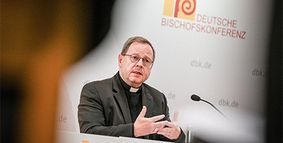
Extract from CathNews, CNS, 21 November 2022
The German bishops’ meeting with officials of the Roman Curia last week was not a “showdown” but it did make clear the Vatican’s strong concerns about Germany’s Synodal Path, said the president of the bishops’ conference. Of particular concern was the Synodal Path’s support for official ministries for women and for a change in Church teaching about homosexuality. Coming at the end of the bishops’ weeklong “ad limina” visits to Rome, the meeting on Friday with the heads of Vatican offices was “a serious test of synodality,” Bishop Georg Bätzing told reporters the next day. In that meeting, “it was important to me to make it clear that the uncovering of abuse and structures that facilitated abuse in the Church have so shattered trust and called into question the authority of the bishops to such a degree that new paths are necessary in order to confront the crisis in the Church,” he said. The German bishops promise to reflect on what was said and heard, he said, but that reflection and the continuing dialogue with the Curia must involve those who “make up the largest part of the people of God: the laity”. “We are Catholics, and we will remain Catholics, but we want to be Catholics in a different way,” Bishop Bätzing said. Claims that the Church in Germany is moving toward a schism “are said from outside and meant to intimidate us”. A joint statement published on Friday by the bishops and the Vatican said the meeting with Curia officials was chaired by Cardinal Pietro Parolin, Vatican secretary of state. “In the perspective of open and fraternal sharing,” the statement said, “some proposals were put forward, such as that of applying a moratorium to the German Synodal Path, which was not accepted, and that of favouring an additional reflection and mutual listening in light of the perplexities that have emerged.”....(More) Photo: Bishop Georg Batzig, CNS, Harald Oppitz, KNA, CathNews 20220221
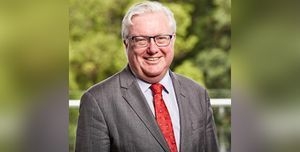
Can the Catholic Church's fledgling experiment with synodality eventually lead to an overhaul of its top-down, monarchical structure of authority?
Limited extracts from Robert Mickens, Rome, La Croix International, 19 November 2022
We're all guilty, at least many of us whose job it is to report or comment on the Catholic Church. Let's just admit it: we are obsessed with bishops. It seems like they are almost always the main focus or at least a significant part of whatever we write or talk about. And why not? Bishops are considered "successors of the apostles by divine institution". They are "teachers of doctrine, priests of sacred worship and ministers of government". These are the men who have been entrusted by God (what else is divine institution?) with the "function of ruling" the Church (cf. Code of Canon Law, no. 375). The bishops are the "high priests" of Catholicism, marked out as the "principal dispensers of the mysteries of God" (can. 853). Wow! Talk about powerful and important people! The bishops possess almost all the authority in the Church, as well. They often delegate this to others, but there is nothing in the law that obliges them to do so. In fact, no significant changes can take place in our life of worship, and no important personnel moves can be made, without their consent. Certainly in the case of diocesan ordinaries, the bishops have the final say in all the consequential matters pertaining to the local faith community. Like an absolute monarchAnd then there's our obsession with the "super-bishop", the Bishop of Rome. Commonly called by his non-juridical title "the pope" (or referenced devotionally as the Holy Father), he is canonically designated as the Roman or Supreme Pontiff. He "enjoys supreme, full, immediate and universal ordinary power in the Church, which he can always freely exercise" (can. 331). In fact, "there is neither appeal nor recourse against a decision or decree of the Roman Pontiff" (can. 333§3). The pope is at the pinnacle of a power structure that exists only in absolute monarchies (of which there are few remaining today) or dictatorships. Theologically, of course, the Bishop of Rome is not a super-bishop. But in the early centuries of Christianity, various popes steadily expanded their juridical authority over other local Churches and, soon enough, the imperial (monarchical) papacy was fully established. If the people and clergy of the local Christian communities once elected the bishops -- that is, when temporal rulers weren't the ones choosing them --, today it's the pope who "freely appoints bishops or confirms those who have been legitimately elected" (can. 377§1).............Is synodality the answer to the problem?...........Obviously, the very idea of synodality can find no home in a top-down, monarchical system where only a tiny group of celibate men ultimately make all the decisions. But if it does become constitutive of the Church, as Pope Francis says it must, then the Church's current structure will have to be changed. Because, otherwise, synodality will end up being nothing but an empty slogan, even a farce, if -- for example -- the Catholic faithful continue to be denied a say in how their bishops are selected. And that includes the Supreme Pontiff himself, the Bishop of Rome........(Source)

Limited Extract from Jim McDermott, America, subscription journal The Jesuit Review, 18 November 2022
Recently, the Archdiocese of St. Louis announced a proposal that would close more than half of its 178 parishes. The issues that the archdiocese has cited are all too familiar in the United States: decreasing attendance and an aging clergy. The fact is, in the United States, young Catholics are not coming to church—in a 2021 CARA survey, only 13 percent of U.S. Catholics aged 18 to 35 said they attended Mass weekly and another 21 percent once a month. Likewise, a poll of Catholics in February showed that while half feel their faith in God improved during the pandemic, only 61 percent anticipated going back to Mass on a weekly basis by the summer. Meanwhile a recent survey of U.S. priests saw half saying that they have experienced some form of ministerial burnout. Strikingly, those most likely to have experienced burnout were the newer priests, those under 45. And due to the shortage of priests in many places, older priests are being asked to stay in stressful, full-time positions long after their lay peers have been able to retire. These are deeply worrying trends, data points that forebode a coming crisis of potentially historic proportions for the American church. It is becoming difficult to imagine what form the U.S. Catholic Church will take in 20 years. We are already near a point where there are not enough priests just to provide sacraments for the parishes that we have. There is no doubt that every bishop is confronted by these issues on a regular, if not daily, basis and that they are struggling to find solutions that can stem the tide. But it is rare to hear a bishop speak from the heart about any of this..........If a bishop were simply to express his fears or concerns, he would get many talented people who would leap to help. It is what people do for each other. For so many Catholics, who love the church and see it struggling, it is also a much-desired chance to be a part of ensuring its life and future. One can feel a sense of impending doom reading about the situation in the church today. But to the extent that they are shared, our struggles also offer opportunities. Bishops, you carry great burdens. But you need not carry them alone....(more) Photo: Priest walks isle of an empty Church, London 2020 lockdown. CNS photo Marcin Mazur, courtesy Conference of Catholic Bishops of England & Wales, America TJW 20221118
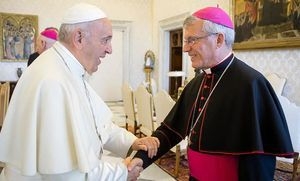
Extract from Adam Wesselinoff, Catholic Weekly 18 November 2022
The link between ordination and governance is up for “re-evaluation”, the president of the Australian Catholic Bishops Conference, Archbishop Timothy Costelloe SDB has said. Speaking to Geraldine Doogue on the Plenary Matters podcast on 13 November, Archbishop Costelloe said Pope Francis had begun to open up new possibilities for Church governance by appointing lay people to key positions in Vatican dicasteries once held by priests. “What are priests and bishops and deacons for, in the Church? They‘re not set apart from the Church, or over the Church or aside from the Church,” Archbishop Costelloe said. “But what are they for in the Church? Now part of the answer to that has always been partly governance. “That’s a theological issue that’s now being opened up, not necessarily to change, but to re-evaluation. To see whether there are other dimensions to that we haven’t seen.” Archbishop Costelloe said that linking governance with power risks the presumption that governance in the church mirrors that of secular society. “I wonder whether we’ve misunderstood the notion of power in a Christian sense, and are unconsciously (perhaps consciously) imposing a different concept of power, a concept of power that operates in the political sphere or corporate world, and just presuming that’s what it should be in the Church,” he said. During the wide-ranging discussion on the achievements of the Plenary Council and synodal processes, Mrs Doogue said the “constant journeying” since Vatican II has been demanding. “And a lot of people resist that, they want much more stability. Which I have a lot of sympathy for – at the moment, does it seem just all over the place to a lot of people?” she asked. “It may do. I can understand why some people are so unsettled by all of this,” Archbishop Costelloe replied. “Sometimes things that people thought might have been rock solid, at least we’re now saying, ‘We need to hear from people how they feel about these things.’ That can unsettle some people.” Mrs Doogue also interviewed Bishop Shane Mackinlay of Sandhurst, who drove much of the Plenary Council process. He will also participate in the Synod on Synodality over the next two years. Speaking about the Second Assembly’s Wednesday protest, sparked by the failure of the deliberative vote on the motions concerning women, Bishop Mackinlay said it was the work of the Holy Spirit. “We were looking into the abyss. People across the room were saying, ‘We cannot go back to the Church in Australia from here, like this.’ The stakes were very high,” he said. Archbishop Costelloe and Bishop Mackinlay joined Plenary Matters during the ACBC’s November session in Sydney, during which the Acts and Decrees of the Plenary Council were to be approved and sent to Rome for review. Archbishop Costelloe said he foresaw no difficulties and that the Church could begin implementing the “broad thrust” and vision of the Plenary Council while waiting for Rome’s response, anticipated in the first half of 2023.....(More). Photo: Pope Francis Archbishop Timothy Costelloe AdLimina 2019 CNS photo Vatican Media Catholic Weekly 20221118
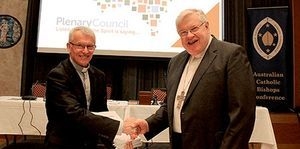
Extract from CathNews, ACBC Media Blog, 16 November 2022
The Australian Catholic Bishops Conference has formally approved the acts and decrees of the Fifth Plenary Council, which will now be sent to the Apostolic See for review. The documents, which comprise five volumes across hundreds of pages, were received at the Bishops Conference’s plenary meeting last week. As the acts and decrees were received, the bishops sang the Te Deum, acknowledging the solemnity of the moment in the life of the Church in Australia. “It was quite a poignant moment as we sensed – once again – the significance of the Council in the life of the Church in Australia,” said Bishops Conference president Archbishop Timothy Costelloe SDB, who also served as president of the Plenary Council. “In fact, my recent trip to Rome underlined how closely the Church around the world was watching the Plenary Council and how aspects of it are being lived out through the global Synod for a Synodal Church.” The decrees are available on the Plenary Council website, where they were published after the Council’s second assembly. The Bishops Conference also approved the terms of reference for the review of the implementation of the Plenary Council. The terms of reference were set out by the Bishops Commission for the Plenary Council, which concluded its work at last week’s plenary meeting. Plenary Council vice-president Bishop Shane Mackinlay said the work of implementation – the Council’s third and final stage – will be critical. The implementation phase will see oversight and coordination for each decree of the Plenary Council entrusted to at least one of the Bishops Conference’s commissions. Those commissions will provide reports to the May 2023 plenary meeting of the Bishops Conference. Another review will be undertaken in 2025, with a final review report to be published in 2027...,...(More) The terms of reference for the implementation phase of the Council have been published on the Plenary Council website: www.plenarycouncil.catholic.org.au Photo: Archbishop Timothy Costello, Apostolic Nuncio to Australia Archbishop Charles Balvo, ACBC, CathNews 200221116
June 17, 1950 - November 8, 2022, Funeral Notice, 11 November 2022
Beloved by his family and friends, Peter has passed away peacefully and after having received countless visits and messages from so many of those who loved him deeply. An extraordinary man who, during a rich and long priestly ministry, worked in polite, positive and resolute advocacy for all communities, no matter individual background or beliefs.
A deeply spiritual man, he touched the lives of all who met him, and showed us how to live life fully, with great compassion and meaning. A Mass of Christian Burial will be Concelebrated at 11am on Thursday November 17 at St Thomas More Catholic Church, 298 Bay Street, Brighton-Le-Sands, 2216. Please note street parking only. For livestream details, please contact a family member. A small private gathering will take place at the burial site. In lieu of flowers please donate to a charity of your choice in Peter's memory.

Limited Extract from America, The Jesuit Review, 10 November 2022
......On the other hand, of course, I do try and live a life that is not in complete internal conflict. But I don’t believe that any Christian or any person trying to live a life of faith expects a life which is not full of conflict. One of the things I’ve tried to resist is the temptation to resolve contradictions. There are some convictions which cannot be resolved or explained away that have to be lived with. It would be, I think, an insult both to the intellectual coherence of a great deal of the church’s teaching and to what I hope may be the moral integrity of my own and many other people’s lives, to say that contradiction can easily be avoided. There was a moment once in a talk I gave at the University of Virginia, on the politics of sexuality. At the end of the talk, a young kid, who must have been about 19, said, “I’m struggling with this. I’m gay, and I’m in the church, and I don’t know what to do. Can you help me?” And I said, “No. I can’t help you. I don’t have the moral authority to help anybody.” Undoubtedly, the very fact of my existence, at some level, in the public area, has provoked and prompted an enormous number of letters and an enormous amount of interest from people in exactly the same position—who want desperately to have a life that can be spiritually and morally whole. The church as presently constituted refuses to grapple with this desire......(Source) Photo: Andrew Sullivan on Charlie Rose 1991, IMDB America TJR 20221110

I had originally thought about commenting on the 6th World Day of the Poor, which will be celebrated this Sunday. But the distressing confession of Cardinal Jean-Pierre Ricard, made public last Monday, distracted me from this intention. The former archbishop of Bordeaux, who was president of the French Bishops' Conference (CEF) from 2001-2007, admitted to having engaged in "reprehensible" conduct with a 14-year-old girl 35 years ago. Our compassion must first of all be for the victim. And it would be indecent to minimize the facts by emphasizing how old they are. We now know, better than we once did, that sexual assault causes deep and lasting wounds, and that it often takes the victim a very long time to talk about what happened. Through this particular victim, the entire People of God in France also feel betrayed yet again, less than three weeks after abuse revelations concerning Bishop Michel Santier. How could a man with such a past have accepted the appointment to be a bishop, and then a cardinal, and even a member of the Congregation for the Doctrine of the Faith — which judges, among other things, cases of pedocriminality in the clergy? "We are aware that the trust that the People of God put in their pastors has been shaken and that for some – perhaps even many – that trust is broken," Archbishop Eric de Moulins-Beaufort, the current CEF president, acknowledged on Tuesday. The credibility of the Church is once again seriously damaged. What is one to do, and what is one to say in such circumstances after exploding in anger and maybe even being tempted to slam the door? Perhaps we should remember that the Church is greater than the faults of its leaders. The Church is also, and above all, those believers who continue against all odds to witness to their fidelity to the Gospel, by praying and serving the little ones, the sick, the poor, the victims of all kinds of abuse, injustices and wars........(MORE). Photo: barque-of-the-church-amidst-the-storm La Croix, 20221110
Tuesday 8 November 2022
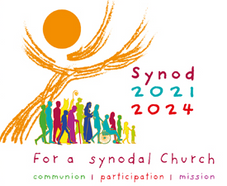
Extract fron CathNews, ACBC Media Blog, 7 November 2022
Groups across Australia are now able to participate in the latest discernment process for the global Synod on Synodality, reflecting on the recently-published Working Document for the Continental Stage. The document, which was drawn from local and national consultation processes undertaken around the world, was published in late October. Capturing what the People of God said during the first year of the Synod journey, the document is designed to enable deeper discernment on the overall question of how the Church is “journeying together”. The national Synod of Bishops committee recently announced that groups of seven to 10 people, comprising a mix of clergy, laity and religious, would be invited to reflect on the Working Document for the Continental Stage. The portal for group submissions is now open and can be found at: www.catholic.org.au/synodalchurch It is expected that members of discernment groups are aware of Church matters at the diocesan and national level. They should be able to read and reflect prayerfully on the document and have experience doing so with similar documents. A reflection guide, also available on the Synod of Bishops website, has been developed to assist with prayer and discernment. “It is important to note that this is not an invitation to start the process of consultation again, but rather the opportunity to reflect more deeply on the voices that have emerged so far,” said Trudy Dantis, chair of the national Synod of Bishops committee. “The distillation and maturation that will take place during this time will help this ongoing journey towards the Synod of Bishops gatherings in Rome in October 2023 and 2024.” The submission portal will remain open until Friday, December 9.......(MORE) Image:synod of Bishope 2021-2024
Extract from CathNews, CNS, 7 November 2022
A society that does not give women the same rights and opportunities as men will become impoverished, Pope Francis said at the end of a four-day visit to Bahrain. “Women are a gift,” he said. After God made man, he didn’t create “a lapdog for him to play with. No, he created two who are equal, a man and a woman.” “All the rights of women stem from this equality,” he said, and a society that is not able to make room for women “does not move forward”. The Pope was speaking yesterday to reporters in response to their questions after visiting the Muslim-majority nation of Bahrain in the Persian Gulf. The aim of the trip, he said, was to experience moments of encounter and dialogue with Muslims, Christians and Catholics. The majority of all residents are foreigners from many different countries, cultures and religions. As a result of these moments of encounter and talks, the Pope said, he learned something new, that this small nation boasts “a culture open to everyone” with “room for everyone”, including women, who, for example, all have the right to work. The Pope was then asked about the protests in Iran, which were sparked by young women and men fighting for more freedoms and reforms in the Shiite-led country, and whether he supported their efforts of demanding fundamental human rights. “The fight for rights for women is an ongoing battle because, in some places, women have achieved rights equal to men” and, elsewhere, they lag behind. Another violation that must be stopped, he said, is female genital mutilation. “How is it that in the world today we cannot stop” this practice? “It is a crime, a criminal act.”....(More)
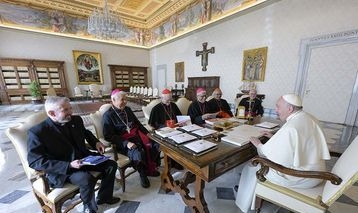
CELAM presents Pope Francis with the results of its First Ecclesial Assembly, proposing several avenues for reform and development within the Church
Limited Extracts from By Félicien Rondel, Mexico, Subscription Journal La Croix International, 3 November 2022
The Latin American Episcopal Council (CELAM) has published a new document detailing the issues that were raised about the future of the Church during the First Ecclesial Assembly of Latin America and Caribbean. The historic assembly, which took place in November 2021 in Mexico City, included representatives from among the bishops, clergy and laity of the region. "We aim to provide a significant contribution to the reflection and the journey of communities across our continent, in the certainty that 'we are all missionary disciples going forth'," says the introduction to the document, which is titled "Toward a Synodal Church Going Forth in the Periphery" ...... A CELAM delegation presented it to Pope Francis on Monday just prior to its publication. Without directly participating in the current synodal process the new document offers reflections on the evolution of the Church on a continent that makes up "48% of the world's Catholics" and is plagued by many challenges............"A call to overcome clericalism" .............Wishing to "overcome clericalism", the bishops also propose the creation of "grassroots ecclesial communities" of lay people to "strengthen their role in pastoral and missionary life". "This sphere can also be a special space for the collaboration of priests who have married and a place of welcome for migrants and other minority groups in their specific situation," the CELAM document says. This comes despite the pope's refusal to to authorize the ordination of married priests on an exceptional basis, as was requested by the Catholic bishops of the Amazon..........(More) Photo:Pope Francis meets leaders of the Latin American bishops' council, CELAM, Vatican, CNS, Vatican Media, NCR 20221104

Big tent Catholicism
Extract from Mike Lewis, Catholic Outlook, 3 November 2022
The “Working Document for the Continental Stage” of the global Synod was released last week with the title “Enlarge the Space of Your Tent,” a reference to Isaiah 54, which serves as a metaphor for one of the central themes of the document—the call for a more welcoming Church. The desire for a Church that is more welcoming appeared throughout the document, echoing calls that came from different Churches from all around the world, such as the United States, Germany, Zimbabwe, and the Greek Melkite Church. The document went on to say that there were certain groups around the world that consistently felt unwelcome in the Church: “Among the most frequently mentioned excluded groups are: the poorest, the lonely elderly, indigenous peoples, migrants without any affiliation and who lead a precarious existence, street children, alcoholics and drug addicts, those who have fallen into the plots of criminality and those for whom prostitution seems their only chance of survival, victims of trafficking, survivors of abuse (in the Church and beyond), prisoners, groups who suffer discrimination and violence because of race, ethnicity, gender, culture and sexuality. In the reports, all of them appear as people with faces and names, calling for solidarity, dialogue, accompaniment and welcome” (no. 40). The metaphor of the big tent is appropriate for the aims of the synod, because, as the document points out, “This tent is a space of communion, a place of participation, and a foundation for mission” (no. 11). Writing for National Catholic Reporter, Christopher White’s analysis focuses on many of the groups who have felt unwanted by the Church. He writes that the document “reckons with a number of topics once considered taboo in the Catholic Church, including women’s ordination, LGBTQ relationships, children of priests, sexism and clergy sexual abuse.” Christopher Lamb’s column for The Tablet focuses on women’s issues and the urgency with which the Synod’s participants want to see them addressed...........(More) Image: Big Tent Catholicism, shutterstock_1209012286_Catholic Outlook 20221103
Limited extract from Christopher Lamb, View From Rome, The Tablet, 3 November 2022
It’s a remarkable document. The synthesis released last week that pulls together the results of the unprecedented listening and discernment exercise in the Catholic Church over the past year doesn’t gloss over difficulties the synod process has faced or offer a “last word” on every contested topic. Instead, it attempts to capture the “sense of the faith” of an extraordinarily diverse, dynamic, multi-cultural universal Church. The report is not an opinion survey or a sociological exercise but a Holy Spirit-listening exercise that urges the People of God – lay people, clergy and bishops – to continue “walking together” along the synodal path, in spite of the pitfalls. The synod process has faced resistance and, in some cases, rejection. Several local church reports spoke of “fears and resistance” from some clergy. This is probably a factor behind Francis’ decision to extend the process by a year, to October 2024. The more synodal Church, bringing the whole People of God together in a communal discernment, is still in its infancy. One of the strongest currents of resistance comes from a relatively small group of ex-Anglicans, including some former Anglican clergy who are now Catholic priests. Their animosity is rooted in their experience of the Church of England’s synod, which brought in reforms they deeply opposed, including the ordination of women priests and bishops. In its submission to the synod, the Personal Ordinariate of Our Lady of Walsingham, set up for former Anglicans, expressed concerns about anything “resembling synodical government”, which had not been “a satisfactory experience” for them. According to 2019 figures 1,850 Catholics and 97 priests belong to the ordinariate; data from 2014 show up to one in 10 Catholic priests in England and Wales are former Church of England clergy. “The synod process in England and Wales has shown that many former Anglicans have trouble grasping the nature of Catholic synodality, which is more akin to processes of ecclesial discernment than the governance of the Church of England, which has powers delegated by the UK Parliament,” Austen Ivereigh, who helped draft the latest synod document, tells me. While Church of England synods are “deliberative”, he said, in the Catholic tradition, synods are consultative, with decisions taken by the bishops with and under the Pope “after careful listening to the Spirit speaking through the sensus fidelium.” ......(More)
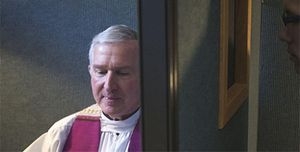
Extract from CathNews, AAP, 2 November 2022
Ministers of religion in Western Australia are now legally required to report child sexual abuse, including information from confessions. Failure to make a mandatory report is now an offence with a maximum penalty of $6000. A minister of religion will not be excused from criminal responsibility even if their belief that there has been child abuse is based on information disclosed during a religious confession. Child Protection Minister Simone McGurk said the McGowan Government was “sending a clear message that nobody is above the law, including ministers of religion”. The new laws deliver on recommendations from the Royal Commission into Institutional Responses to Child Sexual Abuse. The changes also extend mandatory reporting requirements to early childhood, out-of-home care and youth justice workers, as well as registered psychologists and school counsellors. The mandatory reporting laws are being implemented through a staggered approach so the groups receive support to undertake their new responsibilities. Ministers of religion are the first group to come into effect, with other groups to be included in the new provisions in the next three years.....(More). Photo:Priests who fail to report Abuse, CNS Chaz Muth, CathNews 20221102
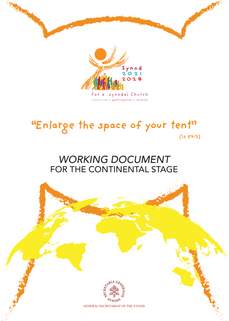
Extracts from and link to Working Document,
Continental Stage for the 2nd phase of the Synod on Synodality, October 2022
“Have among yourselves the same attitude that is also yours
in Christ Jesus, Who, though he was in the form of God,
did not regard equality with God something to be grasped.
Rather, he emptied himself, taking the form of a slave,
coming in human likeness” (Phil. 2:5-7)
1.1 “The fruits, the seeds, the weeds of synodality” 16. The first part of the synodal journey has produced abundant fruit, new seeds that promise new growth, and above all, an experience of joy in challenging times: “Largely, what emerges from the fruits, seeds and weeds of synodality are voices that have great love for the Church, voices that dream of a Church of credible witnesses, a Church that is inclusive, open and welcoming Family of God” (EC Zimbabwe).........(Source)
Extract from by Michael Sean Winters, National Catholic Reporter, 31 October 2022
Two weeks from today, the U.S. bishops will gather in Baltimore for their annual plenary meeting. The most important business will be electing a new president and vice president of the conference from a slate of 10 nominees. Usually, the vice president ascends to the top spot, but this year, the vice president is Archbishop Allen Vigneron of Detroit, who is already 74. To be eligible for election, you must be able to serve the full term before the mandatory retirement age of 75. It is no secret that there are some deep ideological divisions within the bishops' conference. Many U.S. bishops, more than any other hierarchy in the world, have resisted Pope Francis' approach to implementing the Second Vatican Council in a more pastoral, less ideological, manner. The controversy surrounding the Tridentine rite of the Mass is a substantial problem only here and in France. No hierarchy from a major, industrialized country has done less to implement the vision of Laudato Si', the pope's groundbreaking encyclical on care for creation. Last year, as some bishops wanted some kind of statement urging a policy of denying Communion to pro-choice politicians, the Vatican had to throw a wet blanket on the plans, pointing out how out of sync the U.S. bishops were with their brother bishops in the rest of the world.....(More)
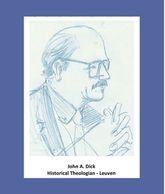
Extract from John A Dick,For Another Voice, 27 October 2022
............Curiously, the Nicene Creed of 325 said nothing about what Jesus had taught, beyond the idea that God is a Father. It said nothing about loving one another, about compassion, or forgiveness, or helping the poor and needy, or renouncing violence, or building bridges with one’s enemies. Christianity shifted its identity focus from correct Christian conduct to doctrinal fidelity and institutional obedience. Jesus had empowered people to change their lives. Constantinian Christianity exercised power over people. Compassion was replaced by control. The episcopal office evolved into an excessively organized institutional bureaucracy. The Council of Trent, held between 1545 and 1563 in Trento, Italy, reinforced the power and position of bishops. Already in the medieval period, Christian bishops had assumed the place of Roman commanders, making secular decisions for their cities, and even leading their own troops in military battles when necessary. Let us not forget that the popes had their own army and navy up until the fall of the Papal States in 1870. The last ships of the papal flotilla were sold in France after the death of Pius IX in 1878. Under the princely acting bishops, relations with ordinary people were not always cordial. The institutional church had become an administrative pyramid and the bishops were at the top. They controlled not only ministry (ministerium) but also theological teaching (magisterium). Bishops became powerful men who had not only institutional power but considerable economic and political power. They had once been called “Father,” but their titles became what they are today “Excellency” or “Eminence.” And of course they began to dress like Renaissance princes in luxurious clothing. Church members, back then as today, had no voice in electing or critiquing their institutional leaders. We should change that today. Certainly the synodal movements point in that direction. But will they be effective? We need a more horizontal leadership structure and a reform much more extensive than the 16th century Reformation. The church should not be an authoritarian pyramid. I think J. P. Grayland, a presbyter of Palmerston North Catholic Diocese in New Zealand, says it very well in an October 26 article in LaCroix: “The Catholic Church cannot avoid institutional change much longer because its institutional model, at least in the West, has passed its ‘use-by’ date. One of the dominant models of perceiving the Church is the model of institution. This model’s decision-making structure is more oligarchical than collegial, and its approach to contemporary questions is preservationist rather than integrationist. Whether we like it or not, the Western Church’s operating model as a hierarchical edifice is challenged by the forces of institutional collapse.”.....(More). Image, John a Dick, Foranothervoice 20221027
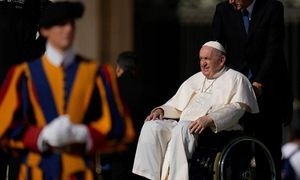
Extract from CathNews NZ, Phyllis Zagano, Religion News Service, 27 October 2022
“The schismatics” is not the name of a new Broadway musical, but it might as well be. Some senior cardinals, deeply unhappy with the 2021-2022 round of the Catholic Church’s worldwide Synod on Synodality, seem to want the entire project to go away. It will not. The synod is projected to be a new-old way of being “church,” a permanent recovery of how the church began and grew. Francis plans it as a change that will outlast his papacy. Even so, too many Catholics still have no idea what “synodality” means. No matter what the naysayers say, it is not a parliamentary event to vote on doctrinal matters of faith and morals. Rooted in the teachings and process of the Second Vatican Council, synodality is understood as “walking together” — a coming to consensus — about the renewal begun following Vatican Two. Of course, synodality means nothing if a national conference of bishops, individual bishops, or pastors ignore the whole idea. Some of them believe that if they ignore the synodal process, they will be able to recover the past. They are the clerics who prefer the fiddle-back vestments and Latin Masses of their real or imagined pasts. They want women kept out of the sanctuary. They want lay people kept in their place. These men simply hope the synod will go away. They may have paid it lip service, with secret invitation-only synod meetings and perfunctory reports. They may have thought they only had a year or so until a new pontificate would erase all this business about consulting the laity. They are wrong. Of course, a new pontificate is precisely what Francis’ opposition hopes for......(More) Photo: Pope Francis wheelchair Vatican, Oct. 5, 2022 AP Photo Alessandra RNS 20221022
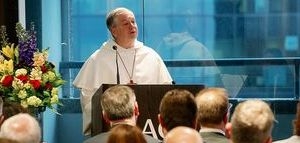
Extract from ACU, Catholic Outlook, Parramatta Diocese, 27 October 2022
Archbishop Anthony Fisher OP has told leaders and students of Australia’s two Catholic universities seven reasons why the pursuit of Catholic higher education is necessary in a world increasingly antagonistic to Christian values. The Archbishop of Sydney made his comments at the inaugural Saint John Henry Newman Annual Symposium lecture on Australian Catholic University’s (ACU’s) North Sydney campus. The symposium is a joint initiative of ACU and the University of Notre Dame Australia (UNDA) and is to be held annually on or near the saint’s feast day of October 7. Speaking on the topic, Newman and the Religion of the Future, Archbishop Fisher identified seven reasons for the continued pursuit of Catholic higher education. This included the importance of providing a sympathetic environment to the exploration of spiritual matters; the need to provide an alternative to dominant wisdom; to be a place that produces scholars and students who have a holistic and robust understanding of Christian teaching; and to prepare and form citizens for the betterment of self and society through holistic education......(More) Archbishop Anthony Fisher OP, inaugural Saint John Henry Newman Annual Symposium lecture, ACU Supplied 20221027

Extract from Christopher Lamb, The Tablet, 27 October 2022
Catholics want the role and vocation of women to be tackled urgently, according to a new report that has come out of the synodal listening process. The landmark synod report says that Catholics repeatedly express the desire for a more welcoming, inclusive Church that eradicates the misuse of power. The findings are contained in a 45-page document released by the Holy See’s synod office that summarises the results of the unprecedented listening and dialogue process as part of the global synod. “Women remain the majority of those who attend liturgy and participate in activities, men a minority; yet most decision-making and governance roles are held by men,” the report states. “From all continents comes an appeal for Catholic women to be valued first and foremost as baptised and equal members of the People of God. There is almost unanimous affirmation that women love the Church deeply, but many feel sadness because their lives are often not well understood, and their contributions and charisms not always valued,” the document states. The role and vocation of women are described as a “critical and urgent area”, with the document calling for further discernment is needed on how to include women in governance roles, the possibility of preaching and the female diaconate. On the ordination of women to the priesthood, which Francis, following John Paul II, has ruled out, the report says a diversity of opinion was expressed, with some in favour and others considering it closed. Where there is a consensus, however, on the need to value the contribution of women to the Church. The report cites a submission from the International Union of Superiors General, the body representing female religious sisters, which said “sexism in decision-making and Church language is prevalent in the Church” and that women religious were sometimes undervalued or viewed as “cheap labour”. Just over twelve months ago, Pope Francis launched the first part of the synod for “a synodal Church” that took place in Catholic communities worldwide and was the largest consultation exercise to have been conducted in human history. The document, published on Thursday, 27 October, offers a snapshot into the views of ordinary Catholics and provides a framework for the next phase of the synod process. It reflects back what has been said so far while the text will be discussed in forthcoming “continental assemblies” in early 2023......(More). Photo: Women out of picture, cardinals and bishops recent Synod of Bishops, CNS photo Claudio Peri, pool via Reuters, The Tablet 20221027
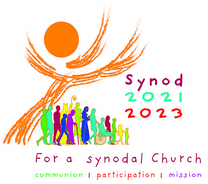
Extract from CathNews, ACBC Media Blog, 26 October 2022
The National Centre for Pastoral Research is inviting groups of seven to 10 people to express their interest in participating in the next round of consultation for the global Synod of Bishops on Synodality. The Document for The Continental Stage, which is drawing content provided in national syntheses from around the world, as well as contributions from Eastern Churches, religious institutes, lay movements and other groups, is due to be published soon. Once the document is released, groups – assisted by a reflection guide being produced by the national Synod of Bishops committee to support prayer, discernment and response – will be able to gather and share their feedback through an online portal. National Centre for Pastoral Research director Trudy Dantis said the opportunity for groups to contribute during the next phase will help the global process that still has about two years to run. “With Pope Francis recently announcing that the Synod on Synodality will be comprised of two sessions – one in October 2023 and a second a year later – there exists a chance for even deeper prayer and reflection,” Dr Dantis said. “The contributions that Australian groups will work on in the weeks after the Document for the Continental Stage is published form part of the ongoing preparations for the meeting of bishops from Oceania, which will take place in February next year.” Those continental gatherings will then provide responses to the Secretariat for the Synod of Bishops as it prepares the instrumentum laboris, or working document, for the Synod assemblies. People wishing to coordinate groups for discernment on the Document for the Continental Phase should email the NCPR’s Stephen Reid (stephen.reid@catholic.org.au) to express interest. .....(More) Find out more about the Synod of Bishops at: www.catholic.org.au/synodalchurch

We are now at a crossroads: do we continue to feed the dinosaur of the current institutional model or do we change?
Limited extract from J.P.Grayland, New Zealand, Subscription Journal La Croix International 25 October 2022
The Catholic Church cannot avoid institutional change much longer because its institutional model, at least in the West, has passed its "use-by" date.One of the dominant models of perceiving the Church is the model of institution. This model's decision-making structure is more oligarchical than collegial, and its approach to contemporary questions is preservationist rather than integrationist.Whether we like it or not, the Western Church's operating model as a hierarchical edifice is challenged by the forces of institutional collapse. Its failure is seen in the continual struggle to manage the collapse of our diocesan and parish infrastructure through "pastoral" workarounds. However, the clarion call to change is the scandal of abuse by clerics because this, more than anything, exposed the institutional decision-making processes that enabled this institutionalized behavior. Secular states, victims' groups and lay Catholic groups are leading the hierarchy by the nose through the humiliating process of change as they challenge the substance and value of hierarchy and magisterium. In many Western societies, "Rainbow Rights" evangelize the Church by calling for significant theological change to the anthropological underpinnings of the institutional model's understanding of humanity, sexuality, gender, morality, ethics, salvation, sacramental mediation, and more. We are hearing the call for a new Weltanschauung (ethos or world view) because the Church's institutional Sitz im Leben or Sitz in der Welt (place in life or in the world) has radically changed. In these instances, the Church's self-understanding as Institutio dei is being questioned even by loyal Catholics. These are forces of theological and anthropological renewal.......(More). Photo: institutional-model-of-the-catholic-church-and-call-for-change La Croix 20221025
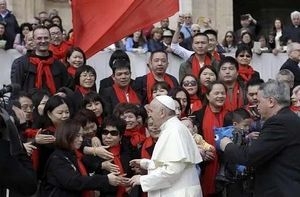
After months of negotiations, the Holy See has again extended an historic 2018 deal with the Communist regime in Beijing on the thorny issue of appointing bishops in China.
Limited extract from Loup Besmond de Senneville and Malo Tresca, Vatican City, La Croix Intetrnational, 24 Oct 2022
The Holy See and China have renewed their historic and controversial 2018 agreement on the appointment of Catholic bishops in the Communist country.The Vatican announced on Saturday that the deal, the details of which have never been made public, would be extended for another two years. It was first renewed in 2020.Negotiations had been underway for months, always in the greatest secrecy. And they followed chaotic paths both at the Vatican and in China.In an interview with L'Osservatore Romano and Vatican News, Cardinal Pietro Parolin – Holy See's Secretary of State – admitted that the text represented an imperfect compromise. "We do not hide the numerous difficulties that affect the concrete life of the Catholic communities, which enjoy our utmost attention," he said.The Vatican's No. 2 official warned that, in order to resolve these difficulties, "new steps forward are necessary, in a collaborative relationship that has multiple protagonists: the Holy See, the central authorities, the bishops with their communities and the local authorities". In fact, four years after it was initially signed, the agreement has drawn strong criticism.On the one hand, some consider that China is too important a subject to be ignored, and that a bad agreement is better than none at all. On the other hand, critics of the protocol denounce it as manipulation by the Communists.In its major push towards the sinicization of religions, hasn't Beijing been presenting this text for years as a Vatican endorsement for an increase of pressure on Catholic communities? Although the stated objective of the agreement is to jointly appoint bishops and try to put an end to the schism that has existed since 1953 between the official Church and the underground Church, it remains difficult to determine the results of the accord.How many bishops have been appointed in four years by the two parties? Only six, and in comparison to the forty or so dioceses that remain vacant, the figure seems miniscule.As for the clandestine bishops, some do not hide their desire to throw in the towel......(More). Photo: vatican-and-china-renew-agreement-on-bishop-appointments La Croix Int 20221024
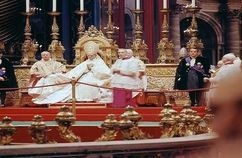
Vatican II, which began 60 years ago, has marked the history of the Catholic Church in the 20th century and is the basis of the synodal process initiated by Pope Francis
Limited extract from Dominique Greiner* Editorial, subscriptional Journal La Croix International, 14 October 2022
The Second Vatican Council opened on October 11, 1962. It was a monumental event during which, "the Church, for the first time in her history, devoted a Council to examining herself and reflecting on her nature and mission," declared Pope Francis at a Mass last Tuesday to its 60th anniversary. And it is in the wake of this ecumenical council that the pope situates the current worldwide synodal process, which will culminate in October 2023 in Rome with the next assembly of the Synod of Bishops. Ecumenical council, synodal process, Synod of Bishops... All this vocabulary can be frightening because of its institutional aspect. But these words are only trying to say something essential about the Church. Councils and synods are moments when brothers and sisters in Christ take the time to meet and listen to one another; to hear the questions of their contemporaries who do not share their faith. Together we are invited to be attentive to what the Holy Spirit - present in the people - is saying to the Church so that it may be faithful to its mission of witnessing to the love of Christ. "What touches all should be approved by all," says the medieval maxim. And this "all" does not tolerate any exclusivity. Even the most insignificant and those who are poorest have a voice. The poor "bear witness to the life that is possible in the heart of the most difficult situations", notes Sister Nathalie Becquart, second-in-command at the general secretariat of the Synod of Bishops. "The poor often experience the Paschal journey that constitutes our Christian identity. We can learn from them this paschal dynamic," she reminds us. A more conciliar and more synodal Church is, in the end, nothing more than a Church that refuses to be stuck in the knowledge and practices of the past, but realizes that it still has much to learn about the paths that lead to holiness. These are paths that the poor can point out to us because they have already preceded us......(More). Photo: Paul VI introductory ingress Vatican Council council, Lothar Wolleh, Wikimedia Commons, La Croix 20221014 *Dominique Greiner is a senior editor at La Croix, moral theologian and Assumptionist priest.

Limited selected extracts from John Warhurst, Eureka Street, 13 October 2022
Freedom of religion, a matter of national interest still to be resolved successfully in the Federal Parliament, has yet again become a focus for the nation’s football codes. The Essendon Football Club in the Australian Football League has followed Manly in the National Rugby League and the NSW Waratahs in the Rugby Union Super League in being caught up in controversy. Yet again it has been the conflict between negative attitudes towards homosexuality and support for social inclusion which has become the inflammatory issue. In the Super League it was Israel Folau’s public posts calling homosexuality sinful. In the NRL it was some players refusing to wear a Pride jumper because of their cultural and religious beliefs. At Essendon FC it involved a controversy over its recently appointed CEO, Andrew Thorburn, formerly the National Australia Bank CEO, who resigned after just 24 hours in the job. Thorburn is the chairman of the City on the Hill group of conservative Anglican churches, whose Melbourne church, in a 2013 sermon, used extravagant language to compare the record of abortion to that of concentration camps, and condemned homosexual acts as sinful.............Catholics should reflect upon several aspects of this debate. First, the Church has an appalling record in Australia in demonstrating freedom of conscience and speech within its own ranks.............Secondly, the Church has not provided much space for the voices of LGBTIQA+ Catholics to be heard within the Church..........Thirdly, once again the Church has found itself embroiled in culture wars in a re-run of the earlier same sex marriage campaign. We have found ourselves grouped in the public’s mind with with some of the most conservative elements in Australian Christianity. That is not where many Catholics, including some other Church leaders, want to be; but it is difficult for most Catholics in leadership roles to say so while maintaining Church unity....(full contribution HERE). Image:Rosary-bead user in crowd, Eureka Street, 20221013
Extract from Christopher White, Vaticanm Natiobal Catholic Reporter, 13 October 2022
Rome — Pope Francis will host an online dialogue with students across the African continent next month as a follow-up to a virtual conversation that began earlier this year with young people across the Americas. The meeting is an effort to continue his promotion of the synod's commitment to direct listening to voices across the Catholic Church. On Nov. 1, Francis will join students from nine African countries and some 27 participating African institutions for "Building Bridges Across Africa: A Synodal Encounter between Pope Francis and University Students," under the theme of "Ubuntu: A Culture of Encounter; We All Belong." "We believe this is a kairos moment for young people to hear from the visible head of the Catholic Church and to offer a fresh mandate, fresh call to action and a fresh mission," said Nigerian Fr. Stan Chu Ilo of the Pan-African Catholic Theology and Pastoral Network and one of the main organizers of the papal dialogue. In February, Francis held a wide-ranging discussion on migration and climate change for nearly two hours with Catholic university students from across the Americas, which grew out Loyola University Chicago's efforts to participate in the 2021-23 Synod of Bishops on synodality.....(More)
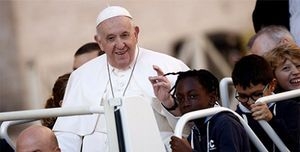
Extract from CathNews, CNS, 13 October 2022
Complaints without any desire to do anything about the situation are poison, Pope Francis said yesterday. Complaining can be “a poison to the soul, a poison to life” and “almost a sin” when it prevents people from building and strengthening “the desire to move forward,” he said during his weekly general audience in St Peter’s Square. The Pope continued his series of talks about discernment by reflecting on the role of desire in discovering what one truly wants or needs in his or her life. Desire, he said, “is the compass to understand where I am and where I am going,” and it can indicate whether a person has just given up and is “standing still”. It is important to be able to recognise sincere desire, which is not a momentary craving, but is something that “knows how to touch deeply the chords of our being, which is why it is not extinguished in the face of difficulties or setbacks,” he said. A sincere desire is what helps people embark on “a successful, coherent and lasting project,” he said. Modifying a popular saying, Pope Francis said the road to hell is paved with good intentions and no action. “The era in which we live seems to promote the maximum freedom of choice, but at the same time it atrophies desire,” the Pope said. “We are bombarded by a thousand proposals, projects, possibilities, which risk distracting us and not allowing us to calmly evaluate what we really want … Desire cannot grow in this way.” But, the Pope said, “by engaging in dialogue with the Lord, we learn to understand what we truly want from life”.....(More). Photo: Pope Francis, general audience Vatican CNS Guglielmo Mangiapane,Reuters,CathNews 20221013

Extract from CathNews, 11 October 2022
Sandhurst Bishop Shane Mackinlay met with Pope Francis last week in his new role as the Catholic co-chair of the Methodist-Roman Catholic International Commission. Source: Dicastery for Promoting Christian Unity. Pope Francis received members of the commission in a private audience on October 5. The commission is the official joint commission between the World Methodist Council and the Dicastery for Promoting Christian Unity. The commission, which first began work in 1967 and has met since without interruption, was meeting in Rome for the first plenary meeting of its 12th round of dialogue. The commission was accompanied to the audience by Cardinal Kurt Koch, Prefect of the Dicastery for Promoting Christian Unity. In his address, Bishop Mackinlay introduced the commission and its current work, which focuses on mission and synodality, and particularly on the way that mission shapes the formulation of doctrine. In his response the Methodist co-chair, Reverend Professor Edgardo Colón-Emeric, presented Pope Francis with the God in Christ Reconciling: On the Way to Full Communion in Faith, Sacraments, and Mission, report, which stemmed from the conclusion of the 11th round of dialogue in 2021. Pope Francis responded by reflecting on the parable of the prodigal son, underlining the report’s scriptural reflection that both Catholics and Methodists are “sons” who, by sin, have wandered from the Father’s house, and who both need to return to the Father to find unity in faith and sacramental life......(More) Photo: Bishop Shane Mackinlay Pope Francis Joint International Commission Dialogue World Methodist Council and Catholic Church Vatican Oct 5 CNS Vatican Media CathNews 20221011
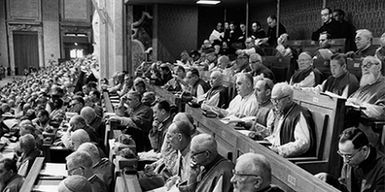
Extract from CathNews (from Cindy Wooden CNS) 11 October 2022
While the term “synodality” is not found in any Second Vatican Council documents, the Council’s vision and definition of the Church is at the heart of synodality, says a message marking Vatican II’s 60th anniversary. Cardinal Mario Grech, secretary-general of the Synod of Bishops, published a message on the Second Vatican Council and synodality yesterday, ahead of today’s 60th anniversary of the opening of the council. The “magna carta” of the 2021-2023 process of the synod “is the council’s doctrine on the Church, particularly its theology of the people of God, a people whose ‘condition is the dignity and freedom of the children of God, in whose heart the Holy Spirit dwells as in a temple’,” he said, quoting from the council’s Dogmatic Constitution on the Church. St John XXIII opened the council on October 11, 1962. All the bishops from all over the world were invited to participate in its four sessions, which St Paul VI concluded December 8, 1965. The current synod process with its listening sessions around the world, its prayer and discernment is focused on the theme, “For a synodal church: Communion, participation and mission.” Those three words, Cardinal Grech wrote, “are eminently conciliar words. The Church that we are called to dream and build is a community of women and men drawn together in communion by the one faith, our common baptism and the same Eucharist, in the image of God the Trinity: women and men who together, in the diversity of ministries and charisms received, actively participate in the establishment of the kingdom of God, with the missionary impetus of bringing to all the joyful witness of Christ, the only saviour of the world.”.....(More) Photo: Bishops at Vatican II session St Peter’s Basilica, CNS, CathNews 20221011

Interview with founder of victims network in France one year after the devastating report on sexual abuse within the Catholic Church in the country
Limited extract from By Christophe Henning,France, Subscription Journal La Croix International, 5 October 2022
It's been exactly one year since France's Independent Commission on Sexual Abuse in the Catholic Church (CIASE) issued its damning 2,500-page report on abuse cases dating from 1950 to 2020. Since the report's publication on October 5, 2021, Church leaders have acknowledged the systemic nature of the abuse crisis. And one of the things they have done in response is to set up bodies for recognition and reparation. But many of the victims say the process is moving too slowly. That is the assessment of Olivier Savignac, founder of Parler et Revivre, one of France's most prominent victims networks. He told La Croix's Christophe Henning that the work of reparation is going well, but the structures overseeing this work are understaffed. La Croix: The CIASE report was eagerly awaited by victims of abuse in the Church. How would you say it's been received? Olivier Savignac: It was revolutionary in its institutional dimension, for the Church of France, the dioceses and the parishes. It was also a shock for people. I am thinking of the victims, of course, but also of the lay faithful, those volunteers who give their time for the life of the Church, who live their faith deeply. Today, some are traumatized and reject everything, while others continue despite their doubts. The report received a lot of media attention. Has that changed things? In some regions, there have been many meetings at different levels - movements, parishes, deaneries - which have addressed the issue of abuse in a very concrete way. In others, there was practically no investment. That's a pity. We were at a turning point and it was an opportunity to be seized. The victims themselves took up the report......(more) Photo: Photo: Olivier Savignac, photo David Richard for La Croix, 20221005

Pope Francis in his special prayer intention for the month of October calls on Christians to pray that the Church be one of synodality, of walking together, along the same road.
Limited extract from La Croix International staff, Switzerland, Subscription Journal La Croix International, 4 October 2022
"Let us pray that the Church, ever faithful to the Gospel and courageous in preaching it, may live in an increasing atmosphere of synodality and be a community of solidarity, fraternity, and welcome," the pope said in his October 2022 video prayer message released by the Vatican. The pope explains synod and synodality by saying that it means walking together. "It means listening to each other in our diversity and opening doors to those outside the Church. It's not about gathering opinions, nor holding a parliament. The synod isn't a survey; it's about listening to the protagonist, the Holy Spirit. It's about praying. Without prayer, there will be no Synod", said Pope Francis. This "is what God expects of the Church of the third millennium – that it regains its awareness of being a people on the road and of having to travel together", he said.....(More). Photo: church-open-to-everyone-is-popes-prayer-intention-october La Croix Int 20221004

Extract from CathNews, NCR Online, 2 October 2022
A group of experts, including several Australians, has met in Rome to draft the working document of the continental phase of the global Synod on Synodality. Australians Susan Pascoe, Fr Ormond Rush and Perth Archbishop Timothy Costelloe SDB were among the group of about 30 lay people, theologians, pastoral workers and bishops who met from September 22 to October 2. Sydney Archbishop Anthony Fisher OP, a member of the Ordinary Council of the Synod of Bishops, was also in Rome for the meetings. “There is a tremendous sense of common purpose among us,” said Ms Pascoe, who has held a number of senior roles in both the Australian government and Church. “Each of us feels an enormous responsibility to faithfully draw out what the people of God submitted.” Ms Pascoe said representatives from six continents worked to “authentically” synthesise the reports of 112 participating episcopal conferences to produce a new document that will guide the Synod’s next phase, which will take place through continental ecclesial assemblies in early 2023 ahead of a Rome meeting in October 2023. On the opening night of the summit, Ms Pascoe said, all the participants were asked to bring a symbol of what synodality means to them and place it at the altar. She brought a copy of the Uluru Statement from the Heart. “What better example of synodality is there than that?”...(more). Photo:Susan Pascoe and members of the synod on synodality document working group Rome NCR, YouTube, Synod.va CathNews 20221003

Polarization and the synodal journey of change
Polarization is evident in families, societies, politics, and the Church
Limited Extract from J.P.Graylamd NZ, Subscription Journal La Croix International, 28 September 2022
Across the globe, liberals and conservatives are polarized over climate change, COVID-19 responses and immigration. In many countries, life is marked by ideological conflict, hostility, and cognitive inflexibility. To say we are a polarized Church may sound insulting when our "intentional language" suggests we are a united community of brothers and sisters, caring for the needy, welcoming the outcast and migrant, feeding the hungry, and worshipping with one voice. Group polarization Group polarization happens when individuals gather "around two conflicting or contrasting positions" and move toward the extremes of a continuum of worldviews, beliefs or opinions. Some people are polarized through being scandalized. A scandal is an intense experience of division based on personalities, nonessential doctrines and willful acts of injustice. Others are polarized through ideological training that places them in opposition to others who become their "sacred enemy". Groups tend towards extremes that the individual members of the group do not necessarily hold. For example, when a group comprises cautious individuals, the group's decision-making will generally be more cautious, slower, and risk-averse than any individual. Where individuals are risk-accepting, their group decisions will be even riskier. Myers and Lamm (1978) note these theoretical underpinnings of group polarization:.........(More) Image:polarization-and-the-synodal-journey-of-change-16667-26 La Croix, 20220928
Interview with Andrea Riccardi, the Italian historian and founder of the Rome-based Sant'Egidio Community
Limited Extract from Bruno Bouvet and Céline Hoyeau, France, Subscription Journal La Croix International, 28 September 2022
The Catholic Church throughout the world continues to deal, country by county and at various paces, with the sexual abuse crisis. In France, the Independent Commission on Sexual Abuse in the Church (CIASE) released a shocking report last year that highlighted the systemic nature and extent of sexual abuse committed in the Church since 1950. This has been a blow to the Church's credibility, admitted Andrea Riccardi, founder of the Rome-based Sant'Egidio Community and one of Europe's keenest observers of contemporary Catholicism. The 72-year-old history professor analyzed the crisis and what comes next in this exclusive interview with La Croix's Bruno Bouvet and Céline Hoyeau. La Croix: One year ago, the Independent Commission on Sexual Abuse in the Church (CIASE) revealed the extent of sexual abuse committed in the Church in France since 1950. How can the Church still be credible in society? Andrea Riccardi: The credibility of the Church has been questioned several times in contemporary history. It has been reproached for being on the side of the rich and the employers, far from the poor and the workers; close to Vichy in France and not to the Resistance, silent on the deportation of the Jews... I could go on and on. But there is a deeper crisis of which the sexual abuse crisis is a sad aspect, a global phenomenon that I really felt the night of the Notre Dame fire. It wasn't just the monument that was burning, but the entire Church. And it was significant that this happened in Paris and in France, which have been the historical laboratory for an encounter between the Catholic Church and modernity. Vatican II owes an enormous debt to French Catholicism... and yet it was in France that the Church was burning. What are the causes of this crisis? The answer is not simple. But the Church's illness is not only a Catholic affair. This is a crisis of Christianity, of secular society. It's a European phenomenon, marked by different symptoms from one country to another. .......(More)

Extract from Michael Sean Winters, Vatican, National Catholic Reporter, 28 September 2022
The U.S. bishops' conference issued its "National Synthesis of the People of God in the United States of America for the Diocesan Phase of the 2021-2023 Synod." The document is exceedingly well done, bringing together into one, concise and readable document the results of 22,000 reports from 30,000 listening sessions, in which the conference estimates some 700,000 people participated. Those numbers are staggering, a rebuke to the naysayers who viewed this process with suspicion. Others have reported on the contents of the report, such as Dennis Sadowski for Catholic News Service's fine summation. I do not suppose anyone was surprised about the issues that arose nationwide: the desire for a more welcoming church, concern about the role of women and the laity, a desire to overcome the divisiveness of society or at least keep it from infiltrating the church, etc. It was refreshing to see a document produced by the bishops' conference acknowledge "the perceived lack of unity among the bishops in the United States, and even of some individual bishops with the Holy Father, [is] a source of grave scandal." So, kudos to everyone who participated in this enormous undertaking and to the staff at the bishops' conference who brought it all together. Now what? That is the question that hangs over the text. Do we wait around until the synodal gathering in Rome in the autumn of 2023? Won't all this positive energy dissipate if we just stand around and watch the wallpaper age? In short, setting aside specific issues, how does the process continue?...(More). Image: SYNODAL-PROCESS-SYNTHESIS-REPORT-Program for a Mass opening the synod process. New Jersey, NCR 20220928
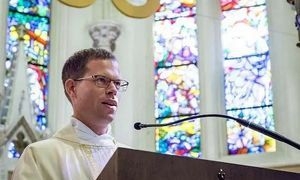
Jesuit professor at University of Louvain explains recent decision by the Flemish bishops
Limited extract from By Jos Moons, Belgium. Subscription journal La Croix International 26 September 2022.
The Catholic Church in the Flemish part of Belgium had the global premiere when it recently became the first in the world to officially allow LGBT Catholics to celebrate their relationship with a ceremony in church. The opening came on September 20 when the Flemish bishops published a three-page document called "Being Pastorally Close to Homosexuals – For a Welcoming Church that Excludes No One". The text is important — and also very Catholic — for three reasons. Pastoral outreach and liturgical celebration First, the document wholeheartedly states full appreciation for gay people. It says they "deserve our support and appreciation", also if they live with a partner and if they want to celebrate their relationship in church. This is a significant step forward compared to the most recent edition of the Catechism of the Catholic Church.....(More). (Photo): Jos Moons SJ, Mapping Synodality Project, University Louvain, KU Leuven, Belgium, La Croix Int, 20220927.

The whole educational ethos of the school must be founded in the Christ-like values of love, compassion, acceptance and forgiveness and on a genuinely Catholic understanding of inclusivity and freedom of conscience
Extract from Paul Collins, La Croix International 24 September 2022 (reprinted from Eutreka Street 20 September)
Last Sunday at Mass the Parish Priest, a sensible, experienced man, mentioned that next week we'd have First Communion and increased numbers of people were expected at Mass. Then he smiled and said: 'We probably won't see them again the following week, but that's OK.' I was pleased to hear that. It is of the very nature of Catholicism that we welcome people, but don't demand they conform to our expectations. We're not a sectarian or exclusive church. The very word 'catholic' means universal, big, embracing. I'm reminded of debates at clergy conferences about whether priests should baptize the children of non-practising Catholics. My view has always been 'yes', reach out to people, be like Jesus and welcome them. But there's a flip side to this. Earlier this month in La Croix, the bishop of Odienné in West Africa's Ivory Coast, Alain Clément Amiézi, complained that 'People are baptized without becoming Christian, the sacraments are given without evangelizing.' He says that 'the number of faithful who are truly committed to … the virtues of the gospel is infinitesimal.' Speaking of African converts he said that just being seen at church is insufficient, that committed Christians have to break the tribal logic of social convention and be willing to critique societal norms and practices in the light of the gospel. That that requires a spirituality of faith and courage. My purpose here is not to critique of African Christianity. You can see exactly the same superficiality in the conversion of Europe in the first millennium. We have an entirely romanticized notion of the medieval 'ages of faith' and the notion of Ireland as 'the island of saints and scholars.'....(More). Image:what-is-a-welcoming-church-La Croix 20220924

Survey elucidates the complex realities of Catholic women's lives, the ways in which they express their faith, and their relationships with the institutional Church
Extract from By La Croix International staff | Vatican City, 22 September 2022
An online community working to create space for dialogue and theological exploration among Catholic women worldwide has produced an extensive survey that reports how women value their Catholic identity despite struggling with church institutions and structures. The Catholic Women Speak network has produced the International Survey of Catholic Women (ISCW) to prepare a submission to the Synod of Bishops as part of the Synod 2021-2023 consultative process initiated by Pope Francis. The survey, devised and managed by researchers, was published in English, French, Polish, Italian, Mandarin, German, Spanish, and Portuguese, and distributed between 8 March .........(More). Image: international-survey-of-catholic-women--insights-to-synod-of-bishops-La Croix 20220922

Extract from Daniel P Horan, National Catholic Reporter, 22 September 2022
Last week, the Pew Research Center published a report that shows Christianity on the decline in the United States. While Christianity remains America's majority religion at present, the new study shows that Christians could make up less than half of the population in just a few decades.
According to an NPR interview with Stephanie Kramer, the study's lead researcher, the study "projected that Christians could make up between 35% and 46% of the U.S. population in 2070," which is down from 90% 50 years ago and 64% in 2020. The major cause for this shift is not necessarily growth in non-Christian traditions, though those are somewhat increasing due to migration. Instead, this decline of Christianity is a direct result of the increasing trend of disaffiliation, especially among younger generations. Those born and raised in Christian traditions are walking away from the church, and in growing numbers. While the Pew study did not specifically examine the reasons for this trend, Kramer said that scholars have offered some theories, including that this might simply be the predictable outcome of an increasingly secular society, while "other people point out that affiliation really started to drop in the '90s. And it may not be a coincidence that this coincides with the rise of the religious right and more associations between Christianity and conservative political ideology." Also last week, my NCR colleague Katie Collins Scott published a lengthy article that chronicles the growing number of dioceses and Catholic-identified institutions that have adopted anti-LGBTQ policies and statements, and traces the deleterious impact these actions have had on queer people, queer youth in particular. When you consider the message of hatred, ignorance, division and discrimination that such dioceses and religious institutions are adopting, it is no wonder that so many people are simply walking away. It is striking to me that many of the supporters of these statements and policies are also those most inclined to lament the decreasing presence of young people at church or the dropping enrollment in Catholic schools............(More). Photo: Anti LGBQT aiden-craver Unsplash, NCR 20220922
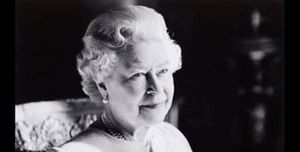
Extract from CathNews, Vatican News, 9 September 2022
Pope Francis has sent his condolences to King Charles III, the people of the United Kingdom and the Commonwealth after the death of Queen Elizabeth II, praising her “witness of faith” and life of service.......
.....Pope Francis sent a telegram to offer his condolences to King Charles for the death of his mother, the UK’s longest-serving monarch. “Deeply saddened to learn of the death of Her Majesty Queen Elizabeth II, I offer heartfelt condolences to Your Majesty, the Members of the Royal Family, the People of the United Kingdom and the Commonwealth.” The Pope said he joins everyone who mourns her loss “in praying for the late Queen’s eternal rest, and in paying tribute to her life of unstinting service to the good of the Nation and the Commonwealth, her example of devotion to duty, her steadfast witness of faith in Jesus Christ and her firm hope in his promises.” Cardinal Vincent Nichols, Archbishop of Westminster paid tribute to her Christian faith and life of unstinting service, The Tablet reports. “Even in my sorrow, shared with so many around the world, I am filled with an immense sense of gratitude for the gift to the world that has been the life of Queen Elizabeth II,” Cardinal Nichols said. “At this time, we pray for the repose of the soul of Her Majesty. We do so with confidence, because the Christian faith marked every day of her life and activity.”....(More). Photo: Queen Elizabeth II, April 21, 1926 – September 8, 2022, The Royal Family, CathNews 20220909
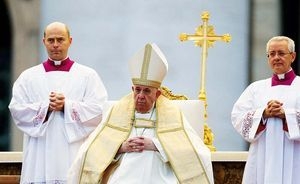
Extract from Christopher Lamb, The Tablet, 8 September 2022
Pope Francis has told the College of Cardinals that he had tried faithfully to carry out the mandate given to him when he was elected nearly 10 years ago. The result of the next conclave will hinge on how satisfied members are with the direction he is taking the Church. After almost 10 years in the job, Francis has just undergone the closest thing a pope has to an appraisal. During two days of intense meetings in the Vatican, the world’s cardinals assessed the landmark reforms he has made to the Church’s central government that were a major part of his brief when they elected him. They have also had a rare opportunity to consider whom they might want to be his successor. Although talk about an imminent papal resignation is almost certainly premature, the closed-door gathering involving cardinals, patriarchs and senior officials of the Holy See’s Secretariat of State had something of a “pre-conclave” feel. The goal-setting and weather-making phase of this pontificate has been completed; we are now in a phase of implementation and consolidation. I spoke to several of those who had been inside the Vatican’s Paul VI Hall on 29 and 30 August about what had been discussed and the dynamic of the debates. Although some resistance to Francis flared up towards the end of the second day, most members of the College of Cardinals gave the Pope’s new constitution for the Roman Curia, only the fourth to have been promulgated since 1588, their approval. There was satisfaction, too, with the progress towards a clean-up of the Holy See’s finances – another issue that was close to the top of the “to do” list when Francis took office. The presence of Cardinal Angelo Becciu in the meeting hall only served to underline the dramatic change: Becciu, once one of the most influential figures in the Curia, is one of 10 defendants in a Vatican corruption trial. It is impossible to imagine a cardinal of his rank being prosecuted for fraud under any of Francis’ recent predecessors. So much has happened over the last decade. In March 2013, it felt like the Church’s central government was in meltdown. The reform of the Roman Curia and tackling the Vatican’s murky and chaotic finances were among the cardinal electors’ top priorities. Francis has produced a new constitution for the Curia and overhauled the Vatican Bank, the Holy See’s investments policy and financial regulatory system, and given the green light to an unprecedented corruption trial. Christoph Schönborn of Austria was among the cardinals who acknowledged that significant steps had been taken towards finally setting the Vatican’s financial affairs in order.....(MORE CFR:Recommend reading this significant article in full), Photo:Pope Francis new Curia constitution, overhauled Vatican Bank, CNS Paul Haring,The Tablet 20220908

Extract from CathNews NZ, The Pillar, 8 September 2022
A German archdiocese is selecting lay people to help to choose its next archbishop. The incumbent, Archbishop Hans-Josef Becker, turns 75 next June and has submitted his resignation to Pope Francis. The Archdiocese of Paderborn says it is drawing lots to choose a 14-member lay group made up of men and women. Paderborn’s cathedral chapter plays a leading role in selecting archbishops. It submits a list of candidates to the pope, who selects three names. The chapter then selects the archbishop from the pope’s shortlist. The archdiocese says the new lay group will work with 14 cathedral canons to draw up the initial list. They will also help choose the next archbishop from the three names the pope identifies. The archdiocese’s new 28-person group developed from a text adopted by the German “synodal way”. The text, “Involvement of the faithful in the appointment of the diocesan bishop,” says cathedral chapters should work with an elected body. It also says the elected body representing “the entire people of God in the diocese” should determine the list of suitable candidates the chapter sends the Vatican. Most chapter members in Paderborn diocese welcomed the document’s recommendations. In June they drew up proposals for involving lay people in electing an archbishop, according to the synodal way’s guidelines. Paderborn is reportedly the first diocese to draw up a specific proposal to implement the synodal way guidelines. Becker, a strong synodal way supporter, approves of including lay people’s input into the selection process. The archdiocese’s website says “after the election … the relevant regional governments are first informed and asked whether there are any reservations of a political nature against the elected person. The pope then appoints the new archbishop”. The initiative faces several major obstacles however.....(More). Photo: German Cathedral, paderborne, CathNews NZ, 20220908
 CathNews 20220902-1.jpg)
Extract from CathNews 2 September 2022
Augustinian provincial Fr Peter Jones OSA was elected president of Catholic Religious Australia, along with a new executive and council, at the 2022 National Assembly in Melbourne this week. Inspired by the theme of the National Assembly, "Daring to Lead with Hope and Gratitude – the role of Religious Life in the 21st Century," the president and council will focus on providing leadership support to CRA’s 150 religious institute members and on encouraging the prophetic voice of religious in the Church in Australia and across contemporary society. Fr Jones succeeds Br Peter Carroll FMS, who was CRA president for two years. “I thank my peers for giving me the opportunity to serve them and the Church at this time when Pope Francis is calling us into a synodal Church,” Fr Jones said. Fr Jones has been a CRA council member since 2019 and has served on CRA committees.....(more). Photo:Fr Peter Jones OSA (CRA) CathNews 20220902

Extract from CathNews NZ, Cathnews NZ Pacific, 1 September 2022
The Catholic Church may be at a turning point in its history, believes Danièle Hervieu-Léger, a leading French sociologist on religion. To survive in secularized Western societies, the institution will have to reform itself, she says. In a new book with fellow sociologist Jean-Louis Schlegel that came out this past spring, “Vers l’implosion? Entretiens sur le présent et l’avenir du catholicisme” (“Toward Implosion: Interviews on the Present and the Future of Catholicism”), she dissects the causes of the current model and suggests possible changes. The book has been generally well received in France. “My conviction is that the Catholic Church is threatened with implosion through the dislocation of its internal structure,” she told Presence info, based in Montreal. “It is a pessimistic diagnosis that the book assumes, and which concerns France, the countries of Western Europe, Canada, the United States — with certain differences — and some Latin American countries. It is an observation of an extremely serious crisis that implies that the institution must lay new foundations to overcome this course.” She said she sees it as the consequence of a system built in response to the Reformation, then reaffirmed in the face of the sociopolitical changes of the 19th and 20th centuries. “This ‘Roman system’ allowed the church to overcome these great crises by strengthening its doctrine and its disciplinary system. Today, it has become a burden that is leading it to implode. The church is sick of a system of clerical power and a territorialised relationship to the world through the parish, which it can no longer manage today in secularized Western societies,” she said. The sexual abuse crisis is forcing the institution to question the deep roots of clericalism and how to redefine the place of the priest in communities, said the sociologist, who points out that the “sacred construction” of the priest is based on the exclusion of women. Considering the female priesthood would, according to her, not allow “women to move to the side of the sacred, but (to) deconstruct the sacred figure of the priest.” “What is very difficult is to redefine theologically the function and status of the priest as a service to the community. “If the Roman Church goes down this road, it will be destroying the system of power that defines it and which has been the framework of its own ecclesiological constitution,” she said. However, if the problem is not solved through reform, it will be solved through the exhaustion of the clerical body, she added.....(More). Photo:Daniele Hervieu-Leger, CNS Hermance Triay, CathNewsNZ 20220901
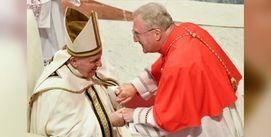
Extract from CathNews, The Tablet, 30 August 2022
England’s new cardinal says those who are “stubbornly opposing” the liturgical reforms of the Second Vatican Council are in danger of adopting a position that is no longer Catholic. Cardinal Arthur Roche, the Prefect of the Dicastery for Divine Worship and Discipline of the Sacraments, was among 20 prelates admitted to the College of Cardinals on Saturday, with 16 of them under the age of 80 and eligible to vote in a future conclave. He has one of the most sensitive and demanding jobs in the Church’s central government, requiring him to work closely with the Pope and with the world’s bishops in overseeing Catholic worship. But the 72-year-old cardinal has also been under attack himself during a time when, as liturgy prefect, he has been closely involved in re-establishing restrictions on the celebrations of the old rite, the form of worship used by the Church before the reforms mandated by the 1962-65 Vatican Council. The new restrictions have been met with a mixture of anger and defiance by some traditionalist Catholics. “The council is the highest legislation that exists in the Church,” Cardinal Roche said. “If you disregard that, you are putting yourself sideways, to the edges of the Church. You are becoming more Protestant than you are Catholic.” Cardinal Roche said reform is taking place, “but it’s a slow process because there are those who are dragging their feet with regard to this and not only dragging their feet but stubbornly opposing what the Church has actually decreed. That’s a very serious matter. In the end, people have to ask themselves: am I really a Catholic, or am I more of a Protestant?”....(more) Photo: Pope Francis cardinal Arthur Roche CNS Vatican Media CathNews 20220830
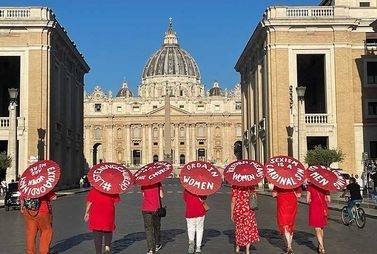
Extract from Christopher White, National Catholic Reporter, 29 August 2022
Rome — As 197 Catholic cardinals, patriarchs and priests entered the Vatican on Aug. 29 for a closed-door, two-day meeting on the church's governance, women's ordination advocates gathered outside to protest the absence of women at the event — only to then be removed from the premises and later detained by Italian authorities. "We hoped our witness would provoke an awakening of their consciences that there are sisters who are outside who are not included in these conversations," organizer Kate McElwee told NCR after being released by the Italian police responsible for the security of St. Peter's Square. Now, according to McElwee, Women's Ordination Worldwide (WOW), the umbrella group that organized the event, is officially "under investigation" for its action. The women's ordination advocates, outfitted in red outfits and carrying red parasols, had gathered near the Vatican just before 8 a.m., prior to the 9 a.m. start of the closely watched Vatican summit. A group of seven women hailing from the United States, the United Kingdom and Poland then marched down Rome's Via della Conciliazione, the iconic street leading into St. Peter's Square, before making its way to the piazza outside the Vatican's Dicastery for the Doctrine of the Faith. There — near the primary entrance to the Vatican's Paul VI Hall, where Pope Francis has convened the College of Cardinals for the Aug. 29-30 meeting — the advocates opened their parasols, which displayed reform slogans such as: "Ordain women," "Sexism is a cardinal sin" and "It's reigning men." As prelates trickled in for the meeting, some smiled and said hello; others took leaflets, as the advocates asked them to "pray for your sisters outside."....(More) Photo: Womens' ordination advocates 29 August NCR Christopher White NCR 20220829

Poland’s Catholics complain of deep divide between clergy, laity
Extract from By Paulina Guzik, Crux, 28 August 2022
KRAKOW – A new report by the Polish bishops, summarizing the results of consultations with both the leadership and the rank and file of the Polish church, points to a deep division between clergy and laity and an urgent need to rebuild he relationship between the two groups. “It (is) not a report about the state of the church,” Archbishop Adrian Galbas, coordinator of the synodal process in Poland, told Crux, referring to a synthesis of the results of widespread consultations published Thursday. “It’s a very personal document, giving an image of the church,” Galbas said – and that image is often fairly harsh. In the Archdiocese of Katowice, the faithful wrote that the church, rocked by sex abuse cases, not only “scandalizes and hurts her people. It is a church that is hopeless, shocked with changes, and one that is frustrating the faithful.” In the Archdiocese of Gdańsk, birthplace of the Solidarity movement, participants commented: “The church is characterized by anonymity, and treats the faithful as a collective of parishioners – it lacks an individual approach to people.” “Yes, it is a difficult read,” Galbas said, but he nonetheless found a silver lining. “What is very hopeful for me is that the people who took part in the synodal path in Poland are those who are very deeply rooted in the church; they are insiders who care about the church,” he said. “The synod is not an audit,” said Aleksander Bańka, a philosopher at the University of Silesia and Polish delegate for the Synod on Synodality, during the presentation of the synthesis. “If what we learn during the Synod is to talk to each other, it will be a success already,” Bańka said. “The Synod is, most of all, about listening to the Holy Spirit,” said Archbishop Stanisław Gądecki, president of the Polish bishops’ conference, during the presentation at Jasna Góra.....(More). Photo:Catholic church Wiejkowo, Poland, AP Photo Monika Scislowska, Crux 20220828

Extract from CathNews, Crux, 23 August 2022
Catholics on two different continents want more inclusion, including of women and LGBTQ Catholics, more adult faith formation and help with engaging young adults. The Vatican set a deadline of August 15 for dioceses and Eastern Catholic churches to release syntheses of the listening sessions set up as part of preparation for the 2023 Synod of Bishops on synodality. In the listening phase, members of parishes, dioceses, religious orders and Catholic movements were asked to consider the ways in which they currently experience the Church as “synodal”, that is, as a community that walks together, and to suggest ways to strengthen that in practice. In responses from Australia, New Zealand and Ireland, several common themes emerged. Among other points mentioned in the Irish synthesis, “There was a clear, overwhelming call for the full inclusion of LGBTQI+ people in the Church, expressed by all ages and particularly by the young and by members of the LGBTQI+ community themselves.” A report from the New Zealand Catholic Bishops Conference said: “It hurts to see family members and friends leaving the Church because they feel they are unacceptable because of gender issues, being divorced and remarried, or in a same-sex relationship.” Australians, too, commented on the need for inclusion, although the national report noted that “the nature of consultations through surveys and group discussions generally favours respondents who are well-educated, more affluent members of the Church and those who are keen to make their opinions known.” In Ireland, the role of women was a persistent theme in the discussions at parish and diocesan level. Some Australians and New Zealanders called for the language used at Mass and other Church ceremonies to be revised. The Vatican Secretariat of the Synod of Bishops will use the synthesised reports from bishops conferences around the world to develop the working document to guide continental or regional ecclesial assemblies that will take place by March 2023......(More). Photo: Aux Bishop Michael Router Armagh, Northern Ireland and steering committee members with national synthesis, Church in Ireland, CNS John McElroy, Archdiocese of Armagh, Cath News 20220823
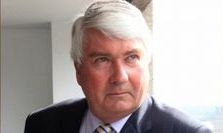
Extract from CathNews, The Australian, 22 August 2022
Jesuit and human rights lawyer Fr Frank Brennan has argued that a successful referendum for an Indigenous Voice to Parliament must win over conservatives to succeed. In a lecture delivered at Mannix College at Monash University in Melbourne last week, Fr Brennan said there was no point in Labor proceeding with a referendum unless both major parties were agreed on the “shape and scope of the Voice”. He argued this would require a compromise: conservatives would need to admit the need for a voice while Indigenous leaders would need to accept stronger limitations on its power. He suggested former Liberal prime minister John Howard and Cape York Institute founder Noel Pearson were the best candidates to strike such a compromise. Fr Brennan said success depended on Australians knowing what the body would look and sound like. He suggested the ability of the Voice to provide advice should be narrowed to special laws that related specifically to Aboriginal and Torres Strait Islanders in order to maximise support across the community. “Why not simply add this provision to the Constitution: ‘There shall be an Aboriginal and Torres Strait Islander voice with such structure and functions as the Parliament deems necessary to facilitate consultation prior to the making of special laws with respect to Aborigines and Torres Strait Islanders.’ “This would be a way of completing the Constitution, not changing it, and consistent with the Uluru statement. This is not the stuff of wedges; it’s the glue to consolidate the unity of the Australian....(More) Photo:Fr Frank Brennan SJ, Facebook, CathNews 20220822
Extract from Bill Uren, Pearls & Irritations, John Menadue website 21 August 2022
At the end of these meetings the Australian bishops were presented with what purported to be a series of eight chapters of reflections which the Roman Curia had drawn from their dialogue with the bishops. This document was called the “Statement of Conclusions”. In contrast, however, with the cordial dialogue which the bishops had entered into with the Vatican officials, there was a wide-ranging and sometimes scathing critique of the current situation of the Catholic Church in Australia. There was, the document said, a crisis of faith, a crisis in Christology, challenges to Christian anthropology, moral problems and problems in ecclesiology. It was imperative that the bishops exercise vigilance in all these areas and particularly over the liturgy. The request of the bishops for greater freedom in permitting the Third Rite of Reconciliation was summarily dismissed. Archbishop Bathersby said that his initial reaction was one of surprise and disappointment. Then he was irritated and more than a little annoyed. Finally, he said: “I was very, very angry”. How did this “Statement of Conclusions” represent in any way the dialogue that had taken place between the bishops and the officials of the various congregations? It was as if the document had been written in advance of the bishops’ visit in general terms and then specified to particularise critically the Catholic Church in Australia. This, of course, was more than twenty years ago. One hopes that under Pope Francis’ reforms Vatican officials are now less insensitive and omnipotent than they were in 1998. But in convoking a canonical Plenary Council the Australian Bishops ultimately chose to involve themselves with a process that is controlled by the Roman Curia through the lens of canons 439 to 446 of the Code of Canon Law.....(More)
Extract ftom CtnNews, The eRecord, 19 August 2022
Archbishop Timothy Costelloe SDB elevates the Eucharist during the ordination Mass of Fr Grzegorz Rapcewicz (left) at St Mary. Perth Archbishop Timothy Costelloe SDB has issued a pastoral letter to Perth Catholics, emphasising the importance of the Eucharist and re-instituting the Sunday obligation to attend Mass from September 4. The letter focuses on what it means to be a Christ-centred Church that is prayerful and Eucharistic. Archbishop Costelloe said with the advent of the COVID-19 pandemic, he temporarily suspended the obligation to attend Mass on Sundays in order to protect vulnerable people and to free them from any conscientious challenges they might have had. “I believe that the time has come to remind us all again of the centrality of the Eucharist and of our need for the Eucharist. For that reason, I am reinstating the Sunday obligation, effective from the first Sunday in September.” “If it is true that the celebration of the Eucharist is at the very heart of the life of the Church and is the most precious gift of God to the Church, then it is impossible to conceive of the Church without the Eucharist. Equally, it is impossible to conceive of a truly faithful, and faith-filled, living of the Christian life for a Catholic apart from regular participation in the Eucharist,” Archbishop Costelloe said. The Pastoral Letter, Archbishop Costelloe’s second in as many months, also details the importance of the celebration of the Eucharist in the local Church. “If there is an obligation born of love to gather each Saturday evening or Sunday to celebrate the Eucharist,” explains Archbishop Costelloe, “there is another obligation, also born of love, which falls primarily on the clergy and on those who cooperate with them to animate the liturgy in the local parish.”....(more)
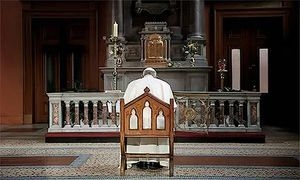
Extract from Irish times, CathNews NZ, 18 August 2022
The report synthesising Ireland’s feedback on the synod on synodality is very clear. “Anyone with two eyes in their head can see that renewal in our church is clearly and urgently necessary. “The challenge is to find the good way of renewal,” says Archbishop of Dublin, Dermot Farrell. The Catholic Church in Ireland and across Europe is on “a journey towards another way of living, with God, and with each other,” he says. He was referring to insights gained from synthesising the diocesan feedback from of Ireland’s synod on synodality. The synthesised report was sent to the Vatican on Monday. The feedback called for several major changes. These include: a greater role for women in the church, including ordination; removal of mandatory celibacy for priests; radical change in the Church’s attitude to LGBTI+ and other marginalised people; a much greater role for the laity. Campaigners for reforming the Catholic Church in Ireland are hoping the report will help bring about radical change to the Church. As an institution it is increasingly out of touch, they say. On Tuesday, Ireland’s former president Mary McAleese described the National Synthesis document as “explosive, life altering, dogma altering, Church altering”. The document had come “not from the hierarchy, not from Rome, but from the people of God”, facilitated by the “openness of the process” which “was never the case before,” McAleese pointed out. It illustrates “the momentum of the people of God for change,” she said. “Clearly there was a very, very strong movement for reform and change and this is reflected fairly and truthfully” in the synthesis document, she added. “There’s no denying those voices now. “I hope when it is received in Rome it will be fully honoured.” She particularly referred to the LBGTI+ focus group, which prepared its own uncompromising report, published with but separate from the Elphin diocese report.....(More) Image: Pope Francis, Change,
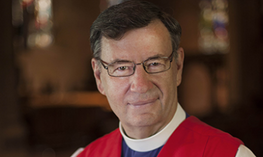
Extract from CathNews, Sydney Morning Herald, 17 August 2022
Australia’s Anglican Church has split, with conservatives who oppose same-sex marriage launching a breakaway movement led by former Sydney Archbishop Glenn Davies. The Diocese of the Southern Cross was formally launched in Canberra on Sunday. The first service was led by a rebel minister who resigned from the liberal Brisbane Archdiocese because he “cannot go along with same-sex blessings”. Archbishop Davies, who finished his term as Sydney archbishop last year, said many Anglicans felt the Australian Church had strayed from the teachings of the Bible, particularly on same-sex marriage. At present, they must move to another diocese if they disagree with their bishop. But they can join the new Church from anywhere – it will cover Australasia, including Papua New Guinea and New Zealand – and Archbishop Davies expected many will do so. The new diocese’s social and theological conservatism – especially that marriage is only between a man and a woman – aligns with the views held by Sydney Anglicans, who are often described as the most theologically and socially conservative in the English-speaking world. But other dioceses, such as Brisbane, Gippsland and Perth, hold different views. They ordain women and are open to blessing same-sex marriages. Most defections to the Diocese of the Southern Cross are likely to come from dioceses with progressive bishops. The issue of same-sex marriage has led to similar splits in North America, Brazil and New Zealand....(More). Photo: Archbishop Glenn Davies, Sydney Anglican Archdiocese, CathNews, 20220817
Extract from Melb Catholic, CAM, 16 August 2022
Catholics in Australia have expressed a strong need for a Church that is missionary and a Eucharistic community that is inclusive, the national synthesis for the global Synod on Synodality reveals. The Australian synthesis, which emerged from a nine-month process that began in October 2021, draws from the diocesan consultation phase for the Synod of Bishops. Earlier this year, Australian dioceses published a report on the findings of their local consultation—a process that every diocese around the world undertook. The National Centre for Pastoral Research prepared the national synthesis based on those diocesan reports. Trudy Dantis, the Centre’s director, said there was much to draw upon from the diocesan reports, which themselves were the result of hundreds of submissions from groups and individuals. ‘We also recognised that the Church in Australia captured very rich information through the Plenary Council, much of which was relevant to the experience of synodality,’ she said. ‘Through the Synod of Bishops and the Plenary Council, we have been able to capture and listen more deeply to the voices of people within and beyond the Catholic population.’ The Australian Catholic Bishops Conference recently approved the national synthesis. Bishops Conference president Archbishop Timothy Costelloe SDB commended Dr Dantis and her team on developing the synthesis. ‘As we have learned through the Plenary Council process, Catholics have very different experiences, different hopes and different aspirations of and for the Church,’ he said. ‘It is a major undertaking to honour all those voices and help present a cohesive picture of the presence—or the absence—of synodality, that process of “walking together”, in our Church. The National Centre for Pastoral Research is to be congratulated for what it has produced.’ Adelaide Archbishop Patrick O’Regan, who along with Bishop Shane Mackinlay will represent the Bishops Conference at the October 2023 gathering in Rome, said the publication of the national synthesis is the next step in a long and important journey. ‘This pilgrimage towards the XVI Ordinary General Assembly of the Synod of Bishops will take three-and-a-half years and will help the global Church to better understand how we can all walk together in seeking to fulfil our mission,’ he said. ‘While this is, in many ways, a new adventure, we in Australia have been blessed to walk this path for the past four years of the Plenary Council. We invite the People of God to keep walking, through the Synod’s three themes of communion, participation and mission.’ Access the national synthesis HERE
Limited Extract from Michael J. O’Loughlin, Subscription Journal, America The Jesuit Review, 16 August 2022
A new report explores how a culture of clericalism contributes to the cover-up of sexual abuse by clergy in the Catholic Church. The study reveals a widespread belief among church personnel that a repression of sexuality, unhealthy power dynamics in Catholic settings and dated views on gender among church leaders foster a culture in which speaking up about wrongdoings is difficult. The report, “‘Beyond Bad Apples’: Understanding Clergy Perpetrated Sexual Abuse as a Structural Problem & Cultivating Strategies for Change,” was researched and written by two professors at the Jesuit-sponsored Santa Clara University, Julie Hanlon Rubio and Paul J. Schutz. Dr. Rubio, who teaches Christian ethics at the Jesuit School of Theology of Santa Clara University in Berkeley, and Dr. Schutz, a teacher in the university’s religious studies department, interviewed hundreds of priests, members of religious communities and lay people working in the church to gather insight about the church’s culture and offer ideas for priests and laypeople to reduce a culture of clericalism. “For many people, the concept of clericalism is familiar, it’s something they’ve heard about and yet we don’t have a common understanding of it.” Dr. Rubio told America. “We really do think that most people’s understanding is that it is pretty individual.” Clericalism, the report argues, is a systemic issue that creates unhealthy environments in the church, and not a phenomenon unique to certain bad actors. A number of Catholic researchers have argued for years that a culture of clericalism perpetuated abuse. More recently, church leaders from Pope Francis to diocesan parish priests have publicly agreed with that sentiment. In 2018, the pope said clericalism had allowed abuse and its cover-up to flourish in the church. But the new report seeks to highlight how clericalism exists as a system that harms even individual actors in the church who would describe themselves as being opposed to it. “Rather than describing clericalism as an individual reality—a problem of ‘bad apples’—this study maps clericalism as a structural reality shaped by the interaction of three forces: sex, gender, and power,” the authors write....(Source). Image: Legionaries of Christ seminarian silhouetted in Regina Apostolorum University chapel Rome 2013, file photo CNS Paul Haring, America, Jes Rev 20220816
Extract from Alejandra Molina, Religion News Service, National Catholic Reporter, 16 Aug 2022
A new report based on interviews with some 300 Catholic priests, nuns and laypeople concludes that clergy aren't adequately prepared to wield the power they exercise and need more education on questions of sex and gender. The report, "Beyond Bad Apples: Understanding Clericalism as a Structural Problem & Cultivating Strategies for Change," released Aug. 15, explores the links between clericalism — clergy's focus on its authority — and clergy-perpetrated sexual abuse. The study's authors, Julie Hanlon Rubio and Paul J. Schutz, both professors at Santa Clara University, a Jesuit institution in Northern California, initially intended to survey 600 respondents, drawn proportionally from lay, religious (those who take vows but are not ordained to the priesthood) and priests, but were turned away by five of the six dioceses and diocesan seminaries they approached. The authors admit that this "likely means that our respondents are biased towards agreement with our theory of clericalism" and that "our data leans in one direction."....(More).

Extracts from Brian Fraga. National Catholic Reporter, 16 Aug 2022
More than a half million U.S. Catholics have participated in synodal listening sessions over the past year as part of Pope Francis' two-year process of grassroots listening ahead of the 2023 Synod of Bishops in Rome, and responses indicate that many Americans want a more welcoming church that reaches out to the marginalized, especially the LGBTQ community, and that allows women to serve in leadership positions, including ordained ministry. A review of more than a dozen synodal "synthesis" reports, posted online by dioceses across the country, also indicates that most Catholics are tired of the polarization in the church; believe that clerics need to do a better job communicating and involving the laity in ecclesial governance; and appreciate the opportunity to be heard, even if they harbor misgivings about what the Synod on Synodality will ultimately accomplish. "I've been really touched by the amount of honesty that I've seen. Sensitive things are coming up, difficult conversations about difficult topics are coming up," said Julie McStravog, a consultant helping to coordinate the U.S. Conference of Catholic Bishops' synodal work. McStravog told NCR that since fall 2021, more than 650,000 Catholics in the United States participated in synodal listening sessions, either online or in person, or responded to written surveys. In all, she said Catholics had more than 30,000 opportunities to participate in the synod......Massimo Faggioli, a theologian and church historian at Villanova University who has written about the synod, told NCR that he was not surprised that participation occurred mostly among older white Catholics who are already involved in the church. He said parish and diocesan outreach in many locations appeared to be geared toward that familiar demographic......The deadline for national episcopal conferences to submit their reports to the Vatican's General Secretariat of the Synod of Bishops was Aug. 15........Described by some observers as "the biggest consultation exercise in human history," the 2021-23 Synod of Bishops' two-year process of global listening and dialogue is set to culminate in an October 2023 gathering of bishops and synod delegates in Rome. Pope Francis and other church leaders have framed synodality as a decisive step in the church's renewal that the Second Vatican Council proposed more than a half century ago.......(More). Photo: Julia McStravog former US Bishops Conference employee, consultant to bishops on discernment for the 2023 Synod of Bishops, CNS Jessica S Zurcher, NCR 20220816
Extract from Michael Sean Winters, National Catholic Reporter, 15 August 2022
A recent article about synodality at First Things magazine by Francis Maier, the longtime amanuensis to former Philadelphia Archbishop Charles Chaput, displays a rhetorical trick that has become a staple of some conservative political operatives and their media hangers-on: Focus on your opponent's strength, and muddy the waters by claiming it is really his or her weakness. The attack is noteworthy because the opponent Maier has selected is Pope Francis. Maier cites his former boss to claim that the synods held under John Paul II, or at least the 1997 Synod on the Americas that Chaput attended, were genuine expressions of the synodal spirit, with free-flowing discussion and exchanges of ideas. "It was a great experience, my first real participation internationally in service to the universal Church," Chaput wrote. "It was there that I met then-Archbishop Jorge Bergoglio from Buenos Aires. He was an impressive man and made good contributions to the discussion. We sat near each other because we'd been appointed archbishops at about the same time. The synod led me to seek out a much closer relationship with the Churches in Mexico and Latin America, and Latino Catholics in the United States." That 1997 synod was a smaller, regional synod, where it was no doubt easier for Chaput, who is not conversant in Italian, to fit in and join the conversations. Pope Francis has made synodality such a central focus of his legacy, I think his critics need to try and derail it. They can’t risk the synodal process being a success. Turning to the 2015 Synod on the Family and 2018 Synod on Youth, Maier relates Chaput's disapproval. "I was very disappointed by what I saw as manipulation of the synods and their agendas by elements within and outside the Church," Chaput said. "Instead of being occasions for an honest exchange of ideas, both synods were dominated by efforts to re-engineer the direction of the Church." Maier recalls the late Archbishop Philip Tartaglia of Glasgow handing Pope Francis a note objecting to certain things being proposed, and claims Francis "dressed him down rudely for writing it, and then walked away." It is not clear why the pope would have been irritated by the contents of something he had apparently not had a chance to even read! My colleague Jesuit Fr. Tom Reese wrote at the time of the 2015 Synod on the Family about some of the changes that were facilitating, not inhibiting, dialogue. He did not perceive anything in the way of manipulation, only the introduction of some new ecclesial approaches. It is worth recalling that well before the 2015 synod, in the wake of the 2014 synod, the opposition to Pope Francis was taking shape, and the shape that opposition took was to denounce the effort to even discuss certain controversial issues. Who was one of the first U.S. archbishops to denounce the first synod under Francis?.......(More). Photo: Pope Francis Archbishop Chaput before session Synod of Bishops on young people, the faith and vocational discernment 2018, CNS Vatican Media, NCR 20220815

The Roman Church's ongoing implosion is accelerated as cardinals call for major doctrinal changes and a former pope tries to save a legacy tied to the ecclesiastical "ancien regime"
Limited extract from Robert Mickens, Vatican City, Subscription journal La Croix International, Published 5 Feb 2022, 12 August 2022
There was more turbulence in Roman Catholicism this past week -- at least on the Old Continent. A number of recent events verified -- to those who are willing to open their eyes and face reality -- that the Roman Church's ongoing implosion is picking up pace. Here are just a few things that happened when many people were probably not paying attention: - Two cardinals close to Pope Francis publicly called for radical changes in certain Church teachings and practices - A bishop in Northern Italy admitted he made a mistake when he took in an American priest that the Vatican had cleared of sexual abuse charges on a legal technicality - Spain's government announced it was launching a major investigation into Church-related sexual abuse because the country's Catholic bishops have refused to do so - And two symbols of the Roman Church's anachronistic ancien regime paradigm -- the Order of Malta and Benedict XVI -- were battling to save their respective legacies. Where does one start? Calls to abolish mandatory priestly celibacy. Perhaps it's best to begin with the latest comments from Cardinal Reinhard Marx of Munich, one of the pope's most trusted aides. The 68-year-old cardinal made a big splash this past week when he said clerical celibacy should be optional. Marx said it would be better for some priests if there were allowed to be married. And his words carry a lot of weight. The hefty German is member of the pope's small group of senior advisors, the Council of Cardinals, and coordinator of the Vatican's Council for the Economy. .........(Source) Photo: Vatican new signs that old order is definitely passing away La Croix International, 20220812

Webinar to unpack Australian Plenary Decree on Deacons and Women
Extracts from Catholic Outlook, 11 August 2022
A webinar will be held to explore the permanent diaconate and women’s diaconal ministry, following the Plenary Council’s decree, “That, should the universal law of the Church be modified to authorize the diaconate for women, the Plenary Council recommends that the Australian Bishops examine how best to implement it in the context of the Church in Australia.” The final Decree 4 of the Plenary Council included these words, “That, should the universal law of the Church be modified to authorize the diaconate for women, the Plenary Council recommends that the Australian Bishops examine how best to implement it in the context of the Church in Australia.” But what exactly is a permanent deacon, especially since the order was renewed at Vatican II? Have there been any precedents for women deacons and how might their ministries inspire us today? Join Dr Phyllis Zagano and Rev Assoc Prof Anthony Gooley to explore these themes in a webinar celebrating the Feast of St Phoebe on 3 September. Brought to you by Australian Catholics Exploring the Diaconate and supported by Catholic Religious Australia, the webinar will be a chance to pray, learn, discuss and be inspired by diaconal ministry past, present and future. The webinar will begin at 10am AEST with prayer, followed by Phyllis speaking on “Who was St Phoebe and how does her ministry inspire us today?”. After breakout time, Deacon Anthony will cover “What are the hopes for the ministry of the permanent diaconate since Vatican II?” A second breakout time will be followed by moderated discussion and a response from former ABC presenter, Genevieve Jacobs AM. Phyllis is an internationally acclaimed Catholic scholar and lecturer on contemporary spirituality and women’s issues in the church........... Deacon Anthony is Associate Dean (Courses) and Head of Leadership and Theology at BBI – The Australian Institute of Theological Education. He is a deacon of the Archdiocese of Brisbane, living and ministering in the Diocese of Broken Bay......(More & Registration details). Photo:Phyllis Zagano, Anthony Gooley (Hofstra University and Broekn Bay Institute) Catholic Outlook, 20220811

Extract from The report of the German Bishops’ Conference
to the World Synod of Bishops 2023, German Bishop Conference, 5 August 2022
The following report is divided into two parts. The first reflects on experiences with synodal processes in the (arch)dioceses and at the level of the German Bishops’ Conference, and also incorporates synodal experiences into this process from the member organisations of the Council of Christian Churches (ACK) in Germany.
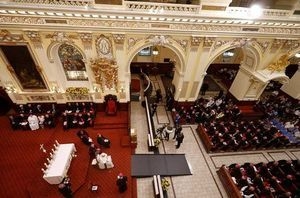
Extract from Opinion Piece, Michael Sean Winters, National Catholic Reporter, 3 August 2022
During his press conference on the plane returning to Rome from Canada, Pope Francis made a remark about so-called traditionalists that rankled some conservative Catholics and confused others. "A church that does not develop its thinking in an ecclesial way is a church that goes backward," the pope said. "That is the problem of many today who claim to be traditionalists. They are not traditionalists, they are 'backwardists.' Tradition is the root of inspiration in order to go forward in the church." The operative word here, of course, is not "traditionalists" or "backwardist," although the latter is expressive and accurate. The key word is "ecclesial." And unlocking what the pope means can be found in the text of the talk Francis gave at vespers at the Cathedral Basilica of Notre Dame in Quebec. There he gave the kind of Christocentric ecclesiological vision that the Second Vatican Council made normative. Recalling his programmatic 2013 apostolic exhortation, Evangelii Gaudium, the pope said, "That is also true of Christian joy: it is a free gift, the certainty of knowing that we are loved, sustained and embraced by Christ in every situation in life. Because he is the one who frees us from selfishness and sin, from the sadness of solitude, from inner emptiness and fear, and gives us a new look at life and history: 'With Christ joy is constantly born anew' (EG, 1)." Then, in his classically blunt style, the Holy Father asked, "So let us ask ourselves a question: How are we doing when it comes to joy? Does our Church express the joy of the Gospel? Is there a faith in our communities that can attract by the joy it communicates?"....(Source). Photo: Pope Francis vespers Cathedral Notre Dame Quebec July 28 CNS Paul Haring, NCR 20220803

An interview with the Secretary to the Council on what comes next for the Church
Limited Extract from Geraldine Doogue, Australia, Subscription Journal La Croix International, 30 July 2022
What did Australia's Plenary Council mean exactly, and what comes next for the church? Secretary to the Council, Fr David Ranson, offers a rich and bracingly realistic set of observations about the Plenary.
As secretary, Fr David was deeply absorbed in the lead-up, in the events of the week itself and now in assessing what comes next. He might surprise you with his judgements. They're delivered by a man with an acute sense of Church procedures but also with an eye to possibilities. Geraldine Doogue: How are you? David Ranson: Still exhausted Geraldine… But I think it wasn't only just the week…there was a great deal of work required leading up to the second assembly [that was] increasing in demand for the last six months….. Meeting in person in the second assembly was something of an unknown and therefore demanded a great deal of preparation…it was a great privilege to be able to be part of such a team. Yes. I hope you really mean that because I think it must have been an amazing– I mean in other words, it's almost a compliment to the scale and the solemnity of that, that you are still exhausted… Was it what you thought it would be? Yes and no. Because I'd been involved, particularly over the last six months in this role as secretary, we had a clear enough sense of how the days might unfold. We knew the agenda, which as you know was contained in the motions and in their amendments that had been developed and articulated prior to the week. So there was a general sense of what needed to be done through the week and the organisation was really at the service of enabling what we knew needed to be achieved to be so achieved. But of course, thankfully, the best plans get thrown into disarray, which is a positive thing, and as you will know of course, come the third day, which is very interesting really from a spiritual perspective because in a retreat context it's always the third day that the dissembling and reassembling takes place and true to form, on the third day of the second general assembly, things were disrupted.....(Source). Image: La Croix International, 20220730
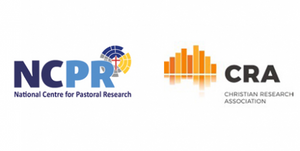
Extract from CathNews, ACBC Media Blog, 26 July 2022
Two of Australia’s most prominent religious research organisations will host a webinar tomorrow to share initial insights into the latest Census results, including on religious affiliation. The Australian Catholic Bishops Conference’s National Centre for Pastoral Research has teamed up with the Christian Research Association to present the free webinar, titled “What the 2021 Census Figures Really Mean”. The Australian Bureau of Statistics released the first data from the 2021 Census last month. Figures on religious affiliation showed Catholics now make up 20 per cent of the population – down from 22.6 per cent in 2016. Catholics, at almost 5.1 million people, remain the largest religious group by a significant margin, followed by Anglicans at 10 per cent. The combined Christian population is now 44 per cent. Those professing no religion comprise 39 per cent of those who answered the question on the Census. Stephen Reid, who works for both the National Centre for Pastoral Research and the Christian Research Association, will present the overall Census data trends in the webinar. Professor Philip Hughes, former director of the Christian Research Association and Professor of Research with Alphacrucis University College, will examine the different patterns across denominations and age groups. National Centre for Pastoral Research director Trudy Dantis will then explain how the Catholic Church in Australia uses Census data to assist its pastoral research. “The data from the Census and other research projects are critical to helping the Church respond to the current and emerging demographic trends in Australian society,” Ms Dantis said. The webinar will be held from 4-5 pm AEST on Wednesday, July 27, and is open to all. Access the meeting at //alphacrucis.zoom.us/j/95965731004 and use the Meeting ID: 959 6573 1004......(More). Photo: religious research organisations analysing interpreting Census data since 1990s, Cathnews, 20220726

Extract from Elise Ann Allen, Crux, 25 July 2022
ROME – In his first public event in Canada after landing in Edmonton yesterday, Pope Francis met with members of different Indigenous communities, offering a highly-anticipated apology for the Catholic Church’s role in what’s been described as a “cultural genocide” associated with the country’s residential school system. Speaking to members of the First Nations, Métis and Inuit communities on the grounds of the former Ermineskin residential school in Maskwacis, Alberta, Pope Francis Monday said the land he was standing on “preserves the scars of still open wounds.” I am here because the first step of my penitential pilgrimage among you is that of again asking forgiveness, of telling you once more that I am deeply sorry,” he said, and apologized “for the ways in which, regrettably, many Christians supported the colonizing mentality of the powers that oppressed the Indigenous peoples. I am sorry.” Francis asked forgiveness for the ways in which members of the Catholic Church, especially members of religious communities, cooperated “in projects of cultural destruction and forced assimilation promoted by the governments of that time, which culminated in the system of residential schools.” While not every part of the legacy of the residential schools is bleak – devotion and charity were also present – Pope Francis said the overall impact of the policies that led to the residential schools “were catastrophic.” Christian faith, he said, “tells us that this was a disastrous error, incompatible with the Gospel of Jesus Christ.”........(More) Photo: Pope Francis kisses hand residential school survivor Elder Alma Desjarlais of Frog Lake First Nation, July 2022, Nathan Denette The Canadian Press via AP, Crux 20220725
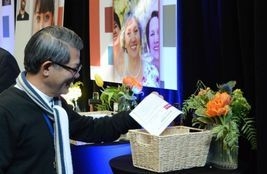
Extract from Homily by Bishop Vincent Long, Parranatta Diocese,24 July 2022
...Last week, nine delegates from our Diocese, including myself, participated as members of the Plenary Council in the Final Assembly in Sydney. This was a historic event in the life of the Church in Australia. We gathered to pray, listen, discern and make decisions, mindful of the voice of the Holy Spirit through God’s Word, tradition, the magisterium and the signs of the times. We were conscious of your communion with us through personal interest, prayers and loving support. As at the first gathering on the feast of St Francis of Assisi, we were stirred by the call issued to us as once to him: “Go and rebuild my Church that is falling into ruins”. We earnestly sought to address the many challenges we face as a community of disciples and map out a better future for the Church going forward. I am pleased to say that the Plenary Council has been a moment of grace, a celebration of hope and a conviction of God’s enduring accompaniment. Like the disciples with Mary in the Upper Room, we were bonded in one common faith, one baptism and one Lord. Despite our differences, which were many and intense at times, we came together with the best interest of the Church at heart. Of the many issues discussed, debated and voted upon, the Plenary Council showed strong support for the Uluru Statement from the heart. Catholics have largely been ahead of the general community on First Nations concerns. We have long learned to honour indigenous language, culture, wisdom, sovereignty and way of life. Calling for a First Nations voice to Parliament to be enshrined in Australia’s constitution is indeed a momentous step. On ecology, there is a recognition of the urgency in addressing the environmental crises of our times and a commitment to join the Laudato Si’ Action Plan. This call to action obliges us not only to care for our common home as a matter of planetary sustainability but also a sense of God-given stewardship. In other words, ecological conversion in all of its manifestations is a deeply spiritual concern arising from our love of God and all of His creation. Our response to the cry of the poor and the cry of the earth is inextricably linked together. One of the most contentious issues was the motion concerning the equality and dignity of women and men in governance structures, ministry and decision-making mechanisms. The discussion took place at a half-way point and proved to be a pivotal moment. Providentially, the reading for that day was part of the Pentecost story. It read “and suddenly from heaven, there came a sound like the rush of a violent wind and it filled the entire house where they were sitting”. We did not expect a kind of “violent wind” that disrupted, changed the group dynamic and led to a moment of profound revelation........(More). Photo: Vincent Long Bishop Parramatta 2nd Assembly PC, Diocese of Parramatta 20220724
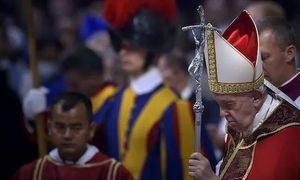
An unsigned Vatican warning to reform-minded German Catholics shows that the pope's "attitude adjustment program" has still not penetrated the culture of the Roman Curia
Limited extract from Robert Mickens, Letter From Rome, Sunsbcription Journal La Croix International, 22 July 2022
It became apparent this week that Pope Francis has been unsuccessful in bringing about the most fundamental Vatican reform he's been aiming at during his nearly ten years in office -- a change of mentality at the Church's bureaucratic center in Rome. "The first reform must be the attitude," the Jesuit pope said in a wide-ranging interview in September 2013. "The structural and organizational reforms are secondary—that is, they come afterward." But while officials have learned to conform -- at least outwardly and most of the time -- to the pope's demands for a kinder, gentler Roman Curia, it's obvious that not all of them have sincerely bought into his "attitude adjustment program". The latest proof of that was the July 21 publication of an unsigned "Statement of the Holy See" that sternly warned Catholics taking part in Germany's Synodal Path that their deliberations have no binding force, especially on the country's bishops. The statement -- which was issued as a "clarification" (Erklärung) in German -- was released by the Holy See Press Office late Thursday afternoon,......(Source). Photo: Pope Francis St Peter's Mass June 2022, picture alliance, Stefano Spaziani, Newscom, MaxPPP, LaCroix Int 20220722
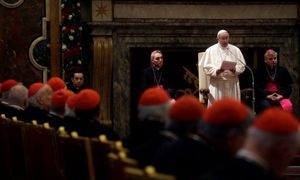
Extract from Opinion piece, Thomas Reese, Religion News Source, National Catholic Reporter, 15 July 2022
After the reforms laid out by Pope Francis are fully implemented, the Vatican Curia will never be the same. His recent predecessors talked about reforming the Curia, but compared with Francis they were simply rearranging deck chairs. Francis' changes, most laid out in his March 19 apostolic constitution Praedicate Evangelium ("Preach the Gospel"), are the most dramatic made to church governance since Pope Paul VI, who, in 1965, established the synod of bishops to advise the pope. This innovation never lived up to its potential because synodal bishops were forced to defer to curial cardinals. Only under Francis have the synodal fathers been freed to speak boldly. Paul also reformed the papal election process by increasing the number of cardinal electors to 120 and barring cardinals over 80 years of age from participating in papal conclaves. He also required curial cardinals to submit their resignations when they reached 75. The reforms of Francis are equally dramatic. He has opened almost all Vatican offices to lay leadership, including heads of dicasteries (formerly called congregations). This means that the even the Dicastery for Bishops, which recommends candidates for the episcopacy around the world, can now be headed by a nun. The head of the Dicastery for Doctrine of the Faith could be a woman theologian. Even the secretary of state, the highest Vatican official under the pope, could be a layperson....(more). Photo:Pope Francis greetings to Roman Curia, Vatican, 2016, Gregorio Borgia, Pool, NCR 20220715

Edited Extract from Mary Brazil, Catholic Outlook, CathNews, 15 July 20222
Pope Francis is helping to “reshape the Church for the third millennium”, British journalist Christopher Lamb said during his recent visit to Australia. Christopher Lamb, who was in Australia to observe proceedings at the second assembly of the Plenary Council, delivered a public lecture titled ‘The Outsider Pope: Where is Francis leading our Church’, hosted by Parramatta Diocese on July 5. Lamb is the Vatican correspondent from The Tablet, and his latest book, The Outsider: Pope Francis and His Battle to Reform the Church, draws on his close observations of Pope Francis and his efforts to renew the Catholic Church. He said the Pope’s consistent and relentless focus on a lived, authentic Christianity has stirred up some arguments against him. “How can a pope both make an incredible global impact, yet also (arouse) intense opposition at the same time? And can he succeed in the battle for Church reform?” he asked. “At its heart, the Francis pontificate is an attempt to implement a Gospel-based reform of the Church by applying the essentials of the Christian faith. It is rooted in a deep trust in the action of the Holy Spirit to update and renew the Church, including its structures.” Lamb described how the Pope got his “outsider” moniker – by being from the "Global South", having not worked or studied in Rome ahead of his election and by choosing to model his pontificate on St Francis of Assisi. “This Pope, like St Francis, seeks a renewal of the Church first and foremost by living the Gospel authentically, embracing poverty, simplicity and a deep love of the Cosmos, the natural world. “It is about mission rather than maintaining the Church’s institutional prestige or financial position.”....(More). Photo: Christopher Lamb lecture Sydney July 5 , Parramatta Diocese, CathNews 20220715
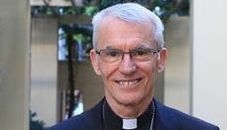
Extract from CathNews, ACBC Media Blog, 14 July 2022
Archbishop Timothy Costelloe SDB has officially taken over the presidency of the Australian Catholic Bishops Conference, two months after being elected to the post. The Bishops Conference’s biennial election of president and vice-president took place at its May plenary meeting. Archbishop Costelloe was elected president, with Archbishop Anthony Fisher OP re-elected vice-president. The bishops agreed to delay the handover of the role until after the second assembly of the Fifth Plenary Council of Australia, for which Archbishop Costelloe served as president for more than four years. The second assembly concluded on Saturday, but the date for the change of president was July 13 – to coincide with the completion of a retreat for bishops that ended on Wednesday afternoon. Archbishop Costelloe, the Archbishop of Perth, becomes the first bishop of a West Australian diocese and the first bishop who is a member of a religious order to lead the Bishops Conference. He succeeds Archbishop Mark Coleridge, who served as president for four years. When elected in May, Archbishop Costelloe said: “As we continue to contemplate how we live out the Gospel in this age ... I look forward to working with my brother bishops and the People of God to carry forward Christ’s mission.”....(more). Photo: Archbishop Timothy Costelloe SDB (ACBC)
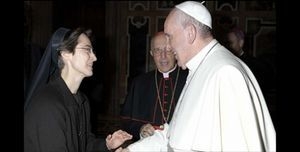
Extract from CathNews, Vatican Media, CNS, 14 July 2022
Ten days after saying he would name two women to the group that helps him choose bishops, Pope Francis appointed three women to the office. The Vatican announced yesterday that the Pope had named 14 new members of the Dicastery for Bishops. For the first time, the members include women: Sr Raffaella Petrini, a member of the Franciscan Sisters of the Eucharist, who is secretary-general of the office governing Vatican City State; Sr Yvonne Reungoat, a French Salesian and former superior general of the order; and Maria Lia Zervino, an Argentine who is president of the World Union of Catholic Women’s Organizations. The dicastery is led by Canadian Cardinal Marc Ouellet and is responsible for helping the Pope choose bishops for Latin-rite dioceses outside of the Church’s mission territories. Members meet twice a month to review dossiers submitted by Vatican nuncios about potential candidates and to vote on the names they recommend to the Pope. Before Pope Francis’ reform of the Roman Curia took effect in June, members of the dicastery were only cardinals and a few bishops. The other new members of the dicastery include: Cardinal Anders Arborelius of Stockholm; Cardinal Jose Advincula of Manila, Philippines; Cardinal José Tolentino de Mendonca, Vatican archivist; and Cardinal Mario Grech, secretary-general of the Synod of Bishops....(more). Photo:The Pope with Sr Raffaela Petrini , Vatican Media, CathNews, 20220714

Decrees, Motions and Voting, Relive the 2nd Assembly, Timeline.
Linked from Plenary Council, 14 July 2022

Extract from Editorial, The Tablet 7 July, linked here 13 July 2022
The consultation of the Catholic faithful in England and Wales, designed to promote the concept of synodality, has to be seen as a striking success. While many features of Catholic life were found to be overdue for reform, the tone was not angry and reproachful but constructive and respectful. The laity, in summary, are appreciative of parish clergy but have had enough of clericalism and want their relationship with the clergy to be reset – for the sake of priests as much as for themselves. Most priests will welcome this, as they too are frustrated. But some have chosen to opt out of the synodal process. They can see nothing wrong with the way things are, and the limit of their ambition is the successful management of decline. Serious questions lie just below the surface of this consultation exercise. Why, 57 years after the conclusion of the Second Vatican Council, has the kind of Catholic Church it called for still not arrived? Why are large groups of lay Catholics, most notably women, still feeling marginalised and excluded, their energies wasted or ignored? Why is the Church not functioning as it should, as a sacramental embodiment of the values of the Gospel, a shining light in a dark world? This may seem like a criticism of the people in charge, the bishops, but none of them has deliberately set out to frustrate the Church’s evangelistic mission. The remedy must lie elsewhere, in a transformation of the culture that the laity and the clergy at all levels are part of – and to a degree stifled by – and in the structures, largely set by Canon Law but also by custom and practice, within which they have to operate. Culture and structure need reform: probably both at once, as they shape each other. Attention should be given, for instance, to the demoralising effect of Canon 129 of the 1983 Code. “Those who have received sacred orders are qualified, according to the norm of the prescripts of the law, for the power of governance, which exists in the Church by divine institution and is also called the power of jurisdiction.” While it goes on to add, “Lay members of the Christian faithful can cooperate in the exercise of this same power according to the norm of law,” governance in the Church – the power to make executive decisions – is denied to those who are not ordained. The Catholic Church has to ask itself whether that makes the appearance of a clerical caste inevitable, with a sense of exclusion for those not belonging to it. In his reform of the Curia, Pope Francis has signalled the end of the theology behind Canon 129, by allowing senior posts in the Curia to be opened to lay men and women. That reform has universal implications. Why should the Catholic Church of England and Wales, or anywhere else for that matter, be governed exclusively by a priesthood of celibate males? That suggests either that government in the Church should be opened to people who are not celibate males by widening the criteria for ordination; or that Canon 129 should be repealed altogether, with its heavily clericalist presumptions, so that the laity can be fully empowered, yet still as laity. Theologically, as Vatican II reminded them, they too are part of a holy priesthood.....(More). Photo: Cardinals Pope Francis' celebration of Mass & process leading to world Synod of Bishops 2023, CNS Remo Casilli, Reuters, The Tablet 7 July 2022
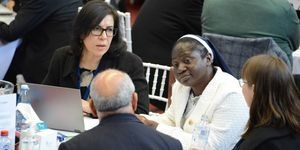
Australia’s historic Plenary Council ended on Saturday with a Mass
and approval of a final statement by the 277 Council members that “The
Holy Spirit has been both comforter and disrupter”. The Council’s final six-day assembly in Sydney included tense and difficult moments, especially last Wednesday (July 6) when the assembly was left in disarray after two motions aimed at promoting women’s roles in Church did not pass. The motions were redrafted and five, reshaped motions relating to the role of women in the Church went to a vote on Friday and passed. Brisbane Archbishop Mark Coleridge who flagged a Plenary Council in 2016, said decisions made after voting on dozens of plenary motions would “have their effect in communities all around Australia”. “These
are not decisions made on Planet Mars, they are really quite concrete
decisions that will have all kinds of effects seen and unseen upon the
communities that make up the Catholic Church around Australia,”
Archbishop Coleridge said. “I can’t predict in detail what those effects will be, but I know that they’ll happen over time.” The
final statement said the Council had been an “expression of the
synodality that Pope Francis has identified as a key dimension of the
Church’s life in the third millennium”. “Synodality is the way of
being a pilgrim Church, a Church that journeys together and listens
together, so that we might more faithfully act together in responding to
our God-given vocation and mission,” it said. The statement
agreed with Pope Francis’ assessment that synodality is “an easy concept
to put into words, but not so easy to put into practice”. Townsville Bishop Tim Harris agreed the Council assembly had been a “powerful and palpable experience of synodality. “And I think that now we’re at the end it’s proved to me that what the
Pope has asked us to do is the right thing to do… the end of the Plenary
is now the beginning of the implementation,” he said. The Plenary Council directly engaged with some of the tough issues
that have confronted the Australian Church – First Nations recognition
and identity, historic child sexual abuse and the safeguarding that is
now needed, and the place of women in the Church. The Plenary
attempted to capture the major issues affecting contemporary Churh life
in Australia, hearing from 222,000 people and the contribution of 17,457
submissions. Now, after final voting, dozens of motions will be scrutinised in the weeks and months ahead. The Plenary concluded with Mass at St Mary’s Cathedral in central
Sydney on Saturday morning. Earlier Council members confirmed the
decrees of the Fifth Plenary Council of Australia, which were then
signed by all bishops present. After a November meeting of the Australian Catholic Bishops Conference, the decrees will be sent to the Holy See. Once recognitio is received by the Holy See, the decrees will be implemented and become the law of the Church in Australian six months later......(MORE) Photo: Plenary Council expression of synodality Mark Bowling Catholic Leader 20220711

Extract from Matthew Knott, The Age, 10 July 2022
Australia’s Catholic bishops have agreed to work to elevate the status of women in the Church – including by potentially serving in the ministry as deacons – after a major gathering plunged into chaos over the issue last week. The schedule for the church’s fifth plenary council, a powerful policymaking event, was suspended after two motions affirming women’s role in the Church failed to pass, prompting about 60 participants to stage a silent protest. Catholic leaders acknowledged the failure to pass the motions had damaged the Church’s reputation, creating the impression its leadership was indifferent to the concerns of female churchgoers. After the motions were slightly redrafted, the plenary council voted overwhelmingly that each Catholic diocese in Australia should commit to creating “new opportunities for women to participate in ministries that engage with the most important aspects of diocesan and parish life”. The participants – including 37 of 43 bishops – supported a motion saying the Church would examine how to best allow women to serve as deacons if such a move is approved by the Vatican. Pope Francis has launched a commission examining whether Catholic women should be able to serve as deacons. Deacons are ordained ministers who do not intend to become priests but can conduct baptisms, witness marriages, perform funeral and burial services outside of Mass, and distribute Holy Communion. Women are allowed to serve as Anglican deacons in most dioceses in Australia, but not in the Catholic Church. The council also passed a motion committing the Church to ensure that “the experiences and perspectives of women, including women who exercise ministry, are heard, considered and valued at local, diocesan and national levels”. Voters also backed a motion calling for the Church in Australia to act “in ways that witness clearly to the equal dignity of women” by “overcoming assumptions, culture, practices, and language that lead to inequality”....(More). Photo: Marilyn Hatton, Catholic feminist, glad Church recognised need to do more to promote role of women, Alex Ellinghausen,The Age 20220710

Extracts from Peter Rosengren, Catholic Weekly, 9 July 2022
As the four year process of the Fifth Plenary Council of Australia comes to an end, there have been both positives and negatives, Archbishop Anthony Fisher OP of Sydney said in an interview on its final day. He said he was cautiously optimistic about its achievements. “There’s been a direct engagement with some of the really ‘hard’ issues, like Indigenous issues, child sexual abuse and the place of women in the Church,” he told The Catholic Weekly newspaper. “Those discussions were sometimes very emotional and potentially very divisive. Yet in the end there was a high level of agreement on most of them. “It’s much better that such matters were confronted directly rather than presenting a kind of faux unity by avoiding the hard issues,” he said. A challenging process “The assembly has offered some good thoughts on liturgy, marriage catechumenate, youth ministry, formation programs for lay leaders including those in rural and remote areas, and stewardship of the earth.” Other positives included a much greater appreciation of the place of the Eastern Catholic churches in Australia than has been seen in Church gatherings before now. It was always going to be difficult to hear, distill and then do justice to contributions from near a quarter of a million people down to two one-week assemblies and the processes in-between. And underrepresentation of ‘ordinary’ priests and indeed ordinary Catholics , including overseas-born ones, was also potentially distorting according to Archbishop Fisher.............“The assembly was structured in a way that created pressure upon the ‘determinative voters’—mostly bishops—to vote along the same lines as the other members (the ‘consultative voters’) in order to show they’d listened to the people. And there were other pressures from some of the members who were quite ideological and outspoken,” he said. “I think we are clearly in a very different world to that of the previous Plenary Councils, where the bishops were seen as undisputedly the leaders of the Church and it was their task as pastors to decide the pastoral direction of the Church. This Plenary was very much set up so the bishops would listen and enact what others thought were the pastoral priorities.” He said this was partly influenced by the spirit of the age and partly by developments in Church thinking. “There’s a very different attitude to authority, leadership and hierarchy today – partly due to the spirit of the age which reduces truth to popular opinion, and partly due to the synodality movement which has called the pastors of the Church to listen to their people and discern alongside them rather than above them. So I would say some of this has come from the heart of the Church and some of it is coming from other places that are not so healthy.”....(MORE) Photo: Archbishop Fisher OP of Sydney, National Catholic Education Commission chair Jacinta Collins, Plenary Council final day, Sydney, 8 July, Giovanni Portelli The Catholic Weekly 20220709
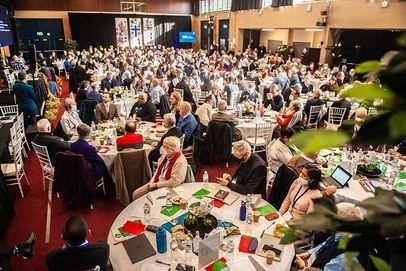
Revised motions on women and the Church have received the necessary votes to pass on the Plenary Council's final day
Extracts from Marilyn Rodrigues, Catholic Weekly, 9 July 2022
(Parts 4,5,6,9,10 and 11 of the Motions And Amendments Documents. 8 July 2022 (HERE)
Further to reports below on Part 4 (Witnessing to the Equal Dignity of Women and Men) note a qualified majority and passing of Motions 4.1, 4.2, 4.3, and 4.4
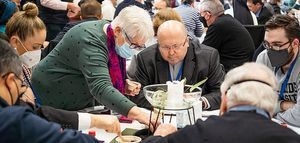
Plenary Council backs action on ecology, Church governance reform
Extract from ACBC, 7 July 2022, Catholic Outlook, 7 July 2022
Plenary Council
Members have passed all six motions they considered on Thursday across
parts of the agenda in the areas of Church governance and integral
ecology. Among the reforms backed
were a call for the establishment of diocesan pastoral councils across
the country, the hosting of diocesan synods within five years of the
conclusion of the Fifth Plenary Council of Australia and the undertaking
of broad consultation about the creation of a national synodal body for
Church collaboration. Those were
captured in the four motions that emerged from Part 7 of the Council’s
Motions and Amendments document entitled “At the Service of Communion,
Participation and Mission: Governance”. All four
motions achieved a qualified majority in both the consultative and
deliberative votes cast on Thursday, and so were passed. Members also
voted on two motions in Part 8, Integral Ecology for the Sake of Our
Common Home, with those two votes achieving a qualified majority in both
the consultative and deliberative votes, therefore passing. The
Council said ecological conversion is “both personal and communal”, and
that there was “urgent need for action” from Catholic entities through
the development of, or alignment with, Laudato Si’ Action Plans inspired
by Pope Francis’ encyclical letter of the same name. The Council
called for the promotion of initiatives in Church and society that
“promote and defend human life from conception to natural death,
especially those who are most vulnerable”. Details
on the final wording of motions and the voting outcomes can be found on
the Motions and Voting page of the Plenary Council website. Follow the second assembly HERE
View the Voting Outcomes for the Fifth Plenary Council of Australia on
Parts 7 and 8 of the Motions and Amendments Document, announced on 7
July 2022, HERE. Rewatch the livestream of the opening session of Day 5 of the Second Assembly HERE.......(MORE) Image: Plenary Council Members plant seeds table gardens PC 2nd Assembly Sydney, ACBC, Catholic Outlook 20220707
Christopher Lamb, in Australia.The Tablet HERE
Australia's Catholic plenary council in crisis over role of women in church
by Marilyn Rodrigues, Catholic News Service. National Catholic Reporter, HERE
Nun challenges Australia's plenary council to give real witness to all baptized
Scriptural studies and theology demand the inclusion of women in the language of Church documents, rituals, says theological adviser, La Croix International HERE
Motion regarding the consideration of women for ministry as deacons received a majority among consultative voters but fell short of a majority among deliberative voters – bishops – and did not pass
Limited Extracts from International Staff, Subscription Journal La Croix International, 7 July 2022
The Second Assembly of Australia's Plenary Council was disrupted after more than 60 of the 277 members protested over issues of women and the Church, including considering women for ministry as deacons. The initiative was "thrown into crisis," reported The Catholic Weekly newspaper as divisions erupted July 6, midway through the final general assembly of the four-year project to revive the local Church. At the plenary council assemblies, consultative votes are exercised by lay, religious and clerical members; deliberative votes by the Australian bishops. The 277 plenary council members include bishops, priests, religious and laypeople. The protest occurred after the outcome of the bishops' votes on "Witnessing to the Equal Dignity of Women and Men." It included various motions such as ensuring that women are appropriately represented in decision-making structures of Church governance and should Pope Francis authorize women for ministry as deacons. The motion considering women for ministry as deacons received a qualified majority among consultative voters but not among deliberative voters and did not pass. Another motion that each Australian diocese foster new opportunities for women to participate in ministries did not pass failing to receive a qualified majority on either the consultative or the deliberative votes........(More)

Pope Francis to appoint women to Vatican office responsible for selecting bishops,
Extract from Christopher White, Vatican, National Catholic Reporter 6 July, linked here 7 July 2022
ROME — Pope Francis intends to appoint two women to the Vatican's Dicastery for Bishops, marking a historic first for the office tasked with advising the pontiff on which Catholic priests to appoint as bishops across the world. "Two women will be appointed for the first time in the committee to elect bishops in the Congregation for Bishops," Francis told Philip Pullella, the Reuters' Vatican correspondent, in an interview that took place on July 2 and was published on July 6. Under the Vatican's new constitution, which took effect on June 5, all Vatican congregations and councils have now been renamed with the newly streamlined title of "dicastery." The constitution also notes that "any member of the faithful can preside over a dicastery," and in the newly published interview, Francis said that Vatican's office for Education and Culture and the Apostolic Library are among those that could be headed by a lay man or woman in the near future......(More). Photo: Pope Francis Sister Jolanta Kafka, president of the International Union of Superiors General May 5, 2022, CNS Vatican Media, NCR 20220606


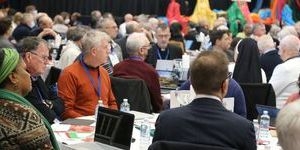
Extract from Mark Bowling, Catholic Leader, 6 July 2022
On day 3 of the Plenary Council a “crisis” erupted inside the assembly about the role that women should play in the Catholic Church in Australia. The program for the 277 assembly members meeting at at St Mary’s Cathedral College in Sydney was dramatically put on hold after a final vote by bishops rejected motions aimed at ensuring women play a greater role in the Church, and included support for admission of women to become Church deacons, if the Pope agreed. Dozens of members, mainly women, walked from the assembly floor in protest, some of them crying. “We were really disturbed,” congregational leader of the Sisters of the Good Samaritan, Sr Patty Fawkner, said. “We stood silently on the sidelines of the assembly. “One of the fruits of the Spirit is peace, and there was definitely no peace in that room.” One assembly observer, theologian, Professor Gerard Kelly said “a crisis is a fork in the road. What these motions basically say is the Church has nothing to say about the role of women, which is devastating” “It basically obliterated all that was there on paper,” Prof Kelly said. One of the rejected motions mentioned “ensuring that women are appropriately represented in decision-making structures of Church governance at the parish, diocese or eparchy, and national level, and in Church agencies” and “ensuring, through formal policies and intentional practice, that the experiences and perspectives of women are heard, considered and valued”, Prof Kelly said: “What is quite clear is that there has been a real sense of anger, disappointment, frustration – a sense that the Church is not listening to the people who are talking to it.” “There’s a sense this is going to force people to walk away again.” Plenary Council vice-president Bishop Shane Mackinlay addressed the assembly proposing that members spend additional time discerning what reservations and concerns are being expressed in the voting process. An official media release from plenary organisers said “the assembly is undertaking this reflection before deciding how to proceed”. During the scheduled lunch break bishops held a closed-door meeting aimed at salvaging the assembly agenda. The assembly reconvened for an afternoon session and at least half of the Plenary Council’s 277 members supported a move to reconsider new motions that addressed Church roles for women. Bishop Shane Mackinlay said this had clearly been an emotional time for many members, but that what had ensued was a sign of the “journeying together” the Council has promoted. “We were able to hear from members – women firstly, but also from men – about how we can better respond to and recognise the gifts that women offer in service of the Gospel,” he said. A four-person writing group has been set up to receive recommendations from members to redraft revised motions. The new motions are expected to be considered later in the week. Townsville bishop, Tim Harris, who supports a greater Church role for women, said he hopes the plenary assembly process can now resume quickly. “I felt terribly for the women who felt ostracised, and some men, by the way,” Bishop Harris said.......(More) Photo: Voting crisis at historic Plenary Council 2nd Assembly, Mark Bowling, Catholic Leader 20220706
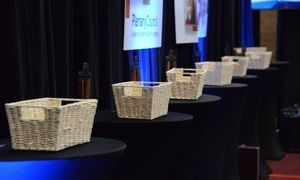
July 6, 2022
Extract from Diocese of Wollongong, ACBC Media blog, 6 July 2022
Members of the Plenary Council are being invited to spend additional time to discern after two motions did not achieve a qualified majority in voting that has taken place over the past 24 hours. The outcomes of the consultative and deliberative votes for motions of parts 3 and 4 of the Motions and Amendments document published last week have been announced. They can be found on the Plenary Council’s Motions and Voting page on the Council’s website. All four motions in part 3 of the document – entitled “Called by Christ – Sent Forth as Missionary Disciples” – achieved qualified majorities on both rounds of voting. Two-thirds of voters present must support a motion to achieve a qualified majority. In part 4 of the document, entitled “Witnessing to the Equal Dignity of Women and Men”, one motion received a qualified majority among the consultative voters but fell just short of a qualified majority among deliberative voters. It therefore did not pass. The other motion did not receive a qualified majority on either the consultative or the deliberative vote. For the deliberative vote on both motions, a majority of votes were placet, which means assent. However, a significant number of votes were placet juxta modum – which means assent with modification – and so a qualified majority was not achieved. Plenary Council vice-president Bishop Shane Mackinlay addressed the assembly after the outcome of the votes was announced. He proposed that the members spend additional time discerning what reservations and concerns are being expressed in the placet juxta modum votes. The assembly is undertaking this reflection before deciding how to proceed....(more). Photo: Plenary Vote baskets 062_20220704_Sessions_FBasile_338
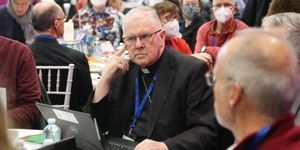
Extract from Mark Bowling, Catholic Leader, 6 July 2022
AMIDST global debate about the role of women in the Catholic Church, Brisbane Archbishop Mark Coleridge says it will be “a close call” today whether a motion to support women becoming Church deacons is supported at Australia’s historic Plenary Council assembly in Sydney. Motions aimed at providing women and men equal dignity in the Australian Church are being put to 277 assembly members – a first vote has already been cast by religious, lay men and women – with a final vote – made exclusively by bishops – to be known later today. To pass, a final vote by bishops on whether to support women deacons would require a two thirds majority. “I suspect it will be a close call but there are very different perspectives on this all held in good faith,” Archbishop Coleridge, outgoing president of the Australian Catholic Bishops Conference, said. Inside the Church, he said a “tectonic shift” is happening in terms of allowing women into decision-making positions, however, he added “it can’t be reduced to simply women being ordained deacons” – an action that would ultimately hinge on Pope Francis agreeing to it. “I think the current model of governance in the Church, where it’s so closely tied to ordination, looks to me to be unsustainable in the future,” Archbishop Coleridge said, outside the closed-door plenary assembly. “Currently you can only govern in the Church if you are ordained… and I think we have to move more to a team approach to governance and leadership and women will have to be very much part of that.” Plenary member, Bishop of Wagga Wagga, Mark Edwards OMI, said that if the deaconate for women went ahead the “great advantage it would offer us is that we would hear a woman preaching at Mass”, but he said from his experience the move would not really help with Church governance since “decisions in the parish aren’t made by the deacon they are make by the priest, and decisions in the diocese aren’t made by the deacon they are made by the bishop”. “So I don’t think it’s a help with governance, governance needs to be addressed in other, creative ways,” he said. Plenary member, Dr Maeve Heaney, Director, Xavier Centre of Theology at Australian Catholic University, said finding a decision-making space for women in the Church implied thinking how our “baptismal identity as prophets, priests and kings interacts with theologies of priesthood and theologies and episcopate”........(more) Photo: Mark Coleridge ponders great Change in Catholic Church, Mark Bowling, Catjolic Leader 20220706
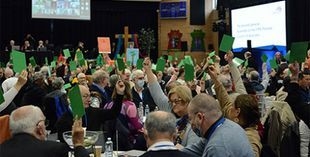
2nd Assembly Results of first six Plenary Council votes announced
Extract from CathNews, ACBC Media Blog, 5 July 2022
The outcome of the initial rounds of voting for the Fifth Plenary Council of Australia were announced yesterday, with all relevant motions being passed with a qualified majority. Members of the Plenary Council voted on six motions from the Motions and Amendments document. Prior to voting, the members agreed on three amendments. Under the Reconciliation: Healing Wounds, Receiving Gifts theme, the members voted to pass a motion that would, among other things, commit the Church to say sorry to Aboriginal and Torres Strait Islander people for the part played by the Church in the harm they have suffered, as well as endorsing the Uluru Statement from the Heart. The members voted for Catholic schools, parishes, dioceses and organisations to respond to recommendations contained in the National Aboriginal and Torres Strait Islander Catholic Council position paper “Embracing Aboriginal and Torres Strait Islanders in the Life of the Catholic Church”. Members also approved a motion for the Bishops Commission for Liturgy and NATSICC to "develop options for the liturgically and culturally appropriate use of Aboriginal and Torres Strait Islander symbols and rituals in Catholic liturgical contexts”.
The second theme considered was Choosing Repentance – Seeking Healing. The members voted for the Plenary Council to say sorry to abuse victims and survivors, their families and communities and recommit the Church to respond with justice and compassion to those who have suffered from the trauma of abuse. The members voted to request the Australian Catholic Bishops Conference, Catholic Religious Australia, and the Association of Ministerial PJPs, with assistance from appropriate experts, to study, acknowledge and address systemic factors which have facilitated abuse within the Church. The members also voted to adopt a new name for the annual Safeguarding Sunday, and for the Bishops Commission for Liturgy to develop appropriate rituals and liturgical resources to be offered to parishes for use on the day. The full details of the motions and votes can be found online at the Motions and Voting page of the Plenary Council website....(more). Photo: Plenary Council members vote on a PC motion ACBC, Fiona Basile, 5 July 2022

Towards a new hopefulness
Extracts from Gail Freyne*, Pearls & Irritations, John Menadue website 3 July 2022
....When Joan Chittister toured Australia these past six weeks a whole lot of hope washed over us.
And a very big meeting was opened: Thousands of us bought tickets to hear her in person, nearly two thousand in Melbourne, eight hundred in Adelaide, eight hundred in Sydney, eight hundred in Brisbane and they were just the public events. Privately, she spoke to hundreds at a gathering of Catholic Religious Australia, for her ‘family’ of Good Samaritan Sisters and Benedictines, and for Mater Health with its ten thousand employees. Most of these events were recorded for national and international viewing, many for religious working overseas. More thousands tuned in to the programme, ‘Soul Search’ on ABC National radio, and on ABC South Australia. Thousands watched a Zoom presented by ACCCR, read interviews in the Adelaide Advertiser, they watched her on The Drum on ABCtv, and listened to her in conversation with Rachael Kohn, Geraldine Doogue and nationally on Zoom conversation with John Warhurst for the states she was unable to visit: Western Australia, the Northern Territory and Tasmania. And, of course, for those in hospital, jail, aged care and the far reaches of the continent who were unable to attend in person. Finally, she spoke to two hundred and fifty of our 14-17 year old students from eighteen Catholic high schools in the Melbourne Archdiocese. They, the hope of the side, blessed with a privileged education, were urged to take the responsibility of being a Public Intellectual in the tradition of Catholic Social Teaching. Why did all these people turn up or tune in? One religious superior put it to me very succinctly: “Joan is an orthodox Catholic to her core”. She is not contradicting church teaching, she is asking us to live it and live it faithfully and more abundantly.........Here we are taught a theology that gives us all we need and yet it is a theology that for nearly five hundred years we backgrounded. The Council of Trent, concluding in 1563, was concerned not so much with orthodoxy but with reform: to abolish the sale of relics and indulgences, to critique the shallowness of church governance, the extremes of sexual and financial misbehaviour of our clerics that seem eerily close to our church today. Happily, this time we have a Pope who teaches that our problems arise from the still present evils of that clericalism and the hierarchy’s refusal to adopt the reform centred Council, Vatican II. Pope Francis has told us that the failure to implement the reforms of Vatican II is central to the dysfunctional situation in which the church finds itself today. Sr. Joan explains: “this Council called upon the church to be the church that the church was meant to be”........(More). *Gail Grossman Freyne, PhD, LL.B, Vice President of Catholics for Renewal, Founding Member, Women’s Wisdom in the Church (WWITCH).
Image: Church Ceiling, PxHere, Pearls & Irritations, 3 July 2022
_________________________________________________________________________________________________